

Character-Driven Fiction Writing Prompts
by Melissa Donovan | Jul 23, 2020 | Fiction Writing Prompts | 12 comments

Creative writing prompts for creating characters.
Most authors agree that fiction is primarily driven by characters. Experienced authors will talk about characters who take over the story, who have their own separate and independent consciousnesses. Outlines and plans for plot go out the window as characters insist on moving the story in a direction of their own design.
Because characters are central to most stories and because their primary function is to explore the human condition, it’s essential for characters to be believable. In other words, characters may not be real, but they most certainly should feel real.
Character Writing Prompts
These character writing prompts are grouped into categories. You can mix and match the prompts according to which ones are most appealing to you, or choose the ones you think will help resolve character problems that you’re struggling with.
Feel free to let these character writing prompts inspire new prompts — in other words, you don’t have to write exactly what the prompt says. One set of prompts deals with character fears and flaws. These might inspire you to write about your character’s strengths and virtues.
Be creative, have fun, and keep writing!
Background and Family
- Unearth your character’s roots. What is the character’s ancestry or cultural background? How does ancestry shape your character? Is the character at odds with family or cultural traditions?
- Write a series of short paragraphical biographies of each of the character’s closest family members: spouse, children, parents, grandparents, siblings, close friends, etc.
- Write a monologue in which your character summarizes his or her life story; be sure to write it in the character’s voice.
Motivations and Goals
- What motivates your character? Money? Love? Truth? Power? Justice?
- What does your character want more than anything else in the world? What are they searching for?
- What other characters or events are interfering with your character’s goals? What obstacles are in the way?
Flaws and Fears
- What is your character’s single greatest fear? Why is your character afraid of this? How did your character acquire their fears?
- What are your character’s flaws and weaknesses?
- How does the character’s fears and flaws prevent them from reaching their goals?
- What does your character look like? Make a list and include the following: hair, eyes, height, weight, build, etc.
- Now choose one aspect of the character’s appearance, a detail (bitten nails, frizzy hair, a scar) and elaborate on it.
- Write a short scene in which your character is looking in the mirror or write a short scene in which another character first sees your character.
Personality
- How does your character feel on the inside? What kind of person is your character and what does the character’s internal landscape look like?
- We don’t always present ourselves to others in a way that accurately reflects how we feel inside. We might be shy or insecure but come across as stuck-up and aloof. How do others perceive your character?
- Write a scene with dialogue that reveals your character’s external and internal personalities. Good settings for this dialogue would be an interview, an appointment with a therapist, or a conversation with a romantic interest or close friend. Write the scene in third-person omniscient so you can get inside your character’s head as well as the other character’s head; this will allow you explore how your character feels and how he or she is perceived.
If you tackle these creative writing prompts, come back and tell us how they worked for you. What did you write? Did you learn anything new about your character or how to write about your character? Share your thoughts by leaving a comment.
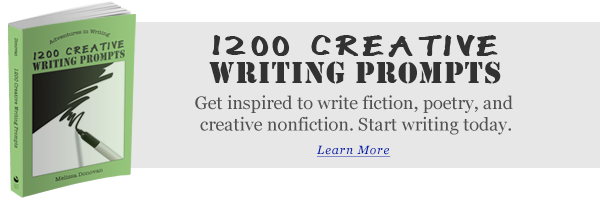
12 Comments
Great ideas! Answering all these questions I really think can make the difference between a round, motivated character and a flat one. Thanks for your ideas 🙂
Thanks, Sarah. Good luck to you!
(Meant to comment yesterday when I stumbled on this!) Great exercises. Helped me to elaborate more on another character I’m beginning to explore for another novel. I’m in the middle of my first novel now! Thanks for this mini-workshop!
Thanks, Tonya! My goal is to come up with exercises and prompts that help writers learn new concepts and techniques, gain experience through practice, solve problems within their own writing projects, and inspire new ideas. I’m thrilled that these prompts helped you solve a particular problem. Your comment totally made my day!
Great suggestions! Dissection or hotseating your character in many different ways is an excellent way of finding out who this person is who’s appeared in your story. I find myself talking through possible conversations as I walk, helping me round out who they are – even if all that information doesn’t end up in the story.
I always imagine character conversations when I’m trying to fall asleep. Sometimes they keep me up all night!
Excellent tips about creating believable characters. I think you did a great job here. The more authors can delve into their character’s background, the better writer they will be and it all gets down to how much the reader likes the book.
In most cases, I think it’s the characters that make stories so compelling. That’s why it’s so important to know your characters well.
This is amazing! Thanks for putting it together! I need writing prompts like this for class. A marketing class at a Polytechnic in Canada, these will be perfect.
Keep up the great work!
You’re welcome! I’m glad you found these helpful.
Thank you Mellissa for this. It is extremely helpful. I am going to relook at the characters I’ve created based on this.
You’re welcome.
Trackbacks/Pingbacks
- And Away We Go! « JS Mawdsley - […] Background and Family -Unearth your character’s roots. What is the character’s ancestry or cultural background? How does ancestry shape…
Submit a Comment Cancel reply
Your email address will not be published. Required fields are marked *
This site uses Akismet to reduce spam. Learn how your comment data is processed .

Subscribe and get The Writer’s Creed graphic e-booklet, plus a weekly digest with the latest articles on writing, as well as special offers and exclusive content.

Recent Posts
- Writing Memoirs
- Do You Need a Place to Write?
- 36 Tips for Writing Just About Anything
- A Handy Book for Poets – Poetry: Tools & Techniques: A Practical Guide to Writing Engaging Poetry
- Creative Writing Prompts for the Young at Heart
Write on, shine on!
Pin It on Pinterest
101 Creative Character Arc Prompts

Need some inspirational help in finding a new and exciting way to develop characters? Thankfully, character arcs aren't as difficult to develop as you might think. You just need a place to start.
A loser becomes a winner. A king becomes a pauper. The skeptic becomes a believer. Often, the best arcs start with a simple question or compelling traits that become the antithesis of the conflict your character is facing.
With that in mind, here are 101 character prompts that writers can test out on their characters — and their story concepts— to find compelling character arcs that can be explored within their stories.
Read More: Acceptance, Revelation, Contentment: Exploring Your Character's Inner Arc
101 Character Arc Prompts
1. What is your character's biggest fear?
2. What is your character's biggest regret?
3. What haunts your character when they stare off into nothing?
4. What, if anything, would your character kill for?
5. What is the most traumatic event from their childhood?
6. What is their most dangerous vice?
7. What is the one obstacle between where they are and what they want most in life?
8. Is your character religious?
9. Is your character anti-religion?
10. Who does your character love?
11. Who is their biggest influence?
12. Who in their lives is a bad influence?
13. What does your character see when they look at themselves in a mirror?
14. Why is the character in their ordinary world at the beginning of the story?
15. Why is your character the one dealing with the main conflict of the story?
16. How does the main conflict most conflict with the main character?
17. Is your character rich or poor?
18. Are they an optimist or pessimist?
19. Does your character have a handicap?
20. Do they have mental health issues?

Joker (2019)
21. What triggers their mental health issues?
22. Who did they hurt in their past?
23. Who hurt them in their past?
24. What does your character strive for most in their life?
25. What makes them laugh?
26. What makes them cry?
27. What makes them lose their temper?
28. What is the most selfish thing your character has done?
29. What is the most unselfish thing they've done for someone else?
30. Does your character have a lot of friends? If not, why not?
31. What is your character's favorite holiday? Why?
32. What is their least favorite holiday? Why?
33. What is your character's biggest flaw?
34. What is their biggest weakness?
35. What causes anxiety in your character?
36. What triggers them? Why?
37. Who is your character's biggest enemy?
38. Who is your character's best friend? Why?
39. Does your character believe in love at first sight?
40. Have they been in love at all?

The Woman King (2022)
41. What are their turn-ons?
42. What are their turn-offs?
43. What gender are your characters?
44. What race is your character?
45. What is your character's sexual orientation?
46. What is the greatest thing your character has done in their lives?
47. Who are their heroes in life? Why?
48. What types of people does your character look down on?
49. Who do they look up to and respect? Why?
50. Who are their mentors ?
51. Why would your character refuse a call to adventure ?
52. What tragedy most affected their life?
53. What tragedy could they have prevented, but failed to?
54. Who does your character need to make amends to?
55. What are they most grateful for in their lives? Why?
56. What causes them shame?
57. What would give them more confidence in life?
58. What would make them believe in God or a higher power?
59. What would make them not believe?
60. Do they work well with others? Why or why not?
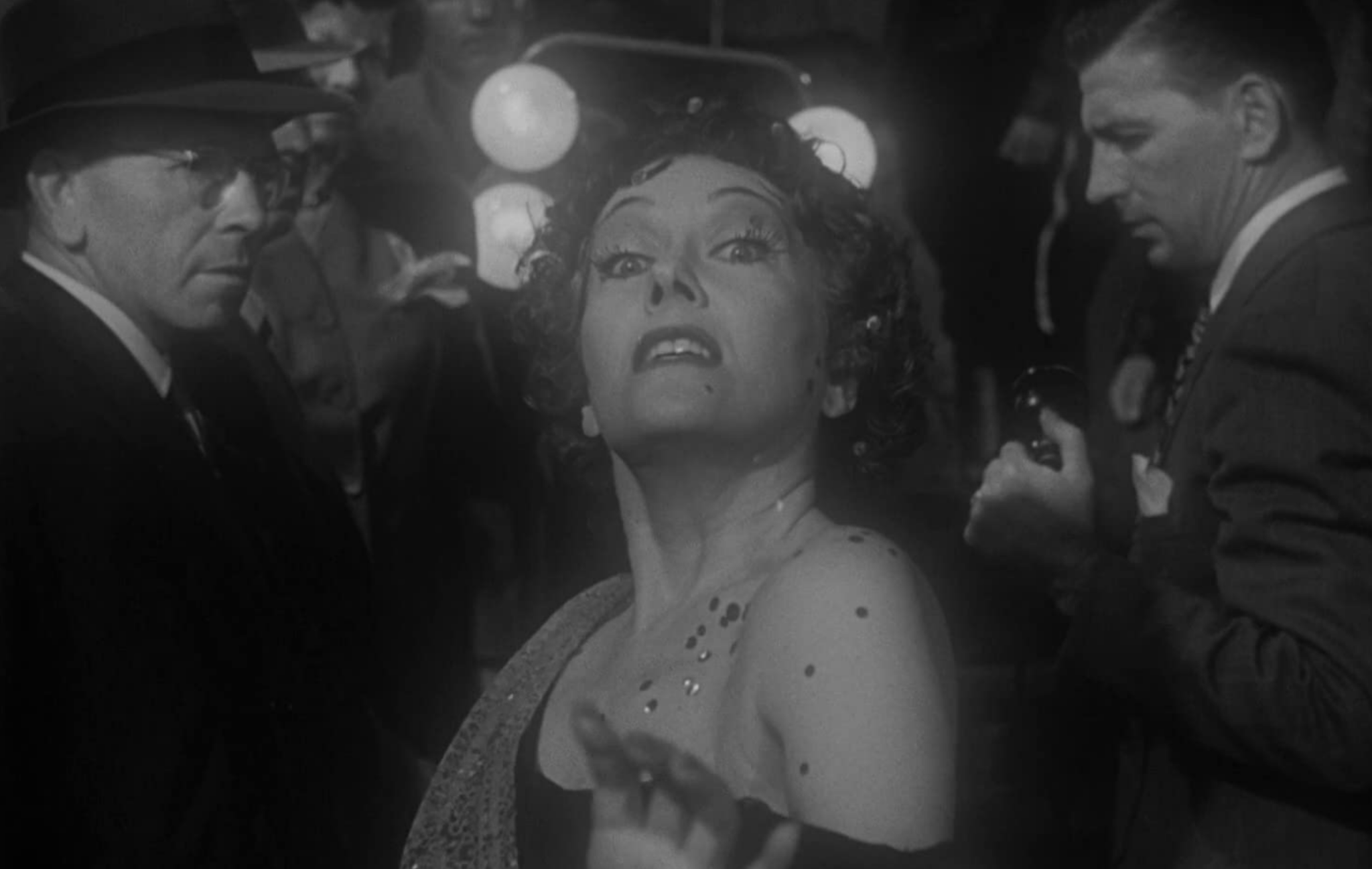
Sunset Blvd. (1950)
61. Is your character a leader?
62. Is your character a follower? Why?
63. What is the biggest grudge your character is holding onto?
64. Does your character lie?
65. What do they lie about? Why?
66. Is your character a coward? Why?
67. Is your character heroic?
68. What's an ailment they are still trying to recover from?
69. What's an injury they haven't healed from?
70. What caused the injury?
71. What are your character's negative habits?
72. What is their favorite movie? Why?
73. What is their favorite book? Why?
74. Does your character belong to a particular organization?
75. What is their innate identity?
76. What new things would rock their world most? Why?
77. Does your character have a family? If not, why are they alone?
78. What is your character most stubborn about?
79. What taboos have they broken within their community? Do they regret it?
80. Does your character trust people?

Toy Story 4 (2019)
81. Is your character trustworthy?
82. Is your character tough?
83. If so, what caused them to be so tough?
84. What would finally "break" your character?
85. Who would your character give their life for most?
86. Is your character loyal?
87. What is your character's greatest bias or prejudice?
88. What is your character's worst nightmare?
89. What is their biggest dream?
90. What is the most embarrassing thing that has happened to your character?
91. What is your character's favorite place in the world?
92. What location scares them the most?
93. What item does your character treasure most?
94. What is your character's deepest physical scar? How did they get it?
95. Does your character fear authority?
96. Do they fight authority at every turn?
97. If your character could make one wish come true, what would it be?
98. What did your character want to be when they grew up?
99. Why did or didn't it work out that way?
100. What does your character want for their birthday?
101. Who does your character want at their wedding?
WANT MORE IDEAS? TAKE A LOOK AT OUR OTHER STORY PROMPTS !
Ken Miyamoto has worked in the film industry for nearly two decades, most notably as a studio liaison for Sony Studios and then as a script reader and story analyst for Sony Pictures.
He has many studio meetings under his belt as a produced screenwriter, meeting with the likes of Sony, Dreamworks, Universal, Disney, Warner Brothers, as well as many production and management companies. He has had a previous development deal with Lionsgate, as well as multiple writing assignments, including the produced miniseries Blackout , starring Anne Heche, Sean Patrick Flanery, Billy Zane, James Brolin, Haylie Duff, Brian Bloom, Eric La Salle, and Bruce Boxleitner, the feature thriller Hunter’s Creed , and many produced and distributed Lifetime thrillers. Follow Ken on Twitter @KenMovies
CHECK OUT OUR PREPARATION NOTES SO YOU START YOUR STORY OFF ON THE RIGHT TRACK!
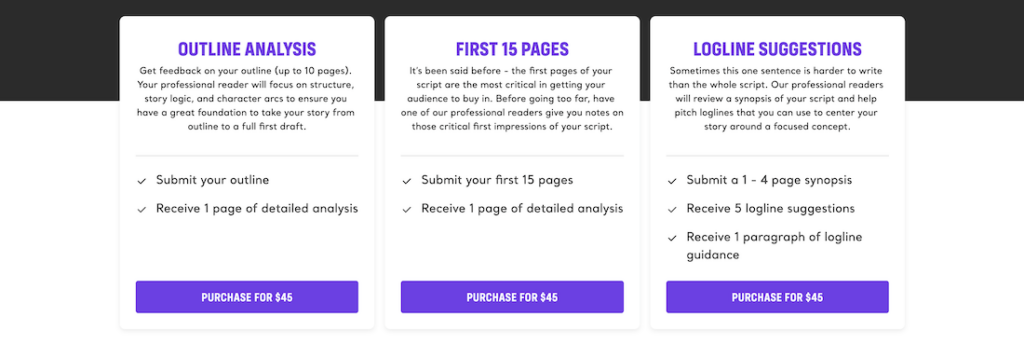
Get Our Screenwriting Newsletter!
Get weekly writing inspiration delivered to your inbox - including industry news, popular articles, and more!
Facebook Comments
Free download.

Screenwriting Resources:

$ 15.00 $ 12.00 Add to cart
Popular Posts

Recent Posts

Next Related Post

Get Our Newsletter!
Developing your own script.
We'll send you a list of our free eCourses when you subscribe to our newsletter. No strings attached.
You Might Also Like
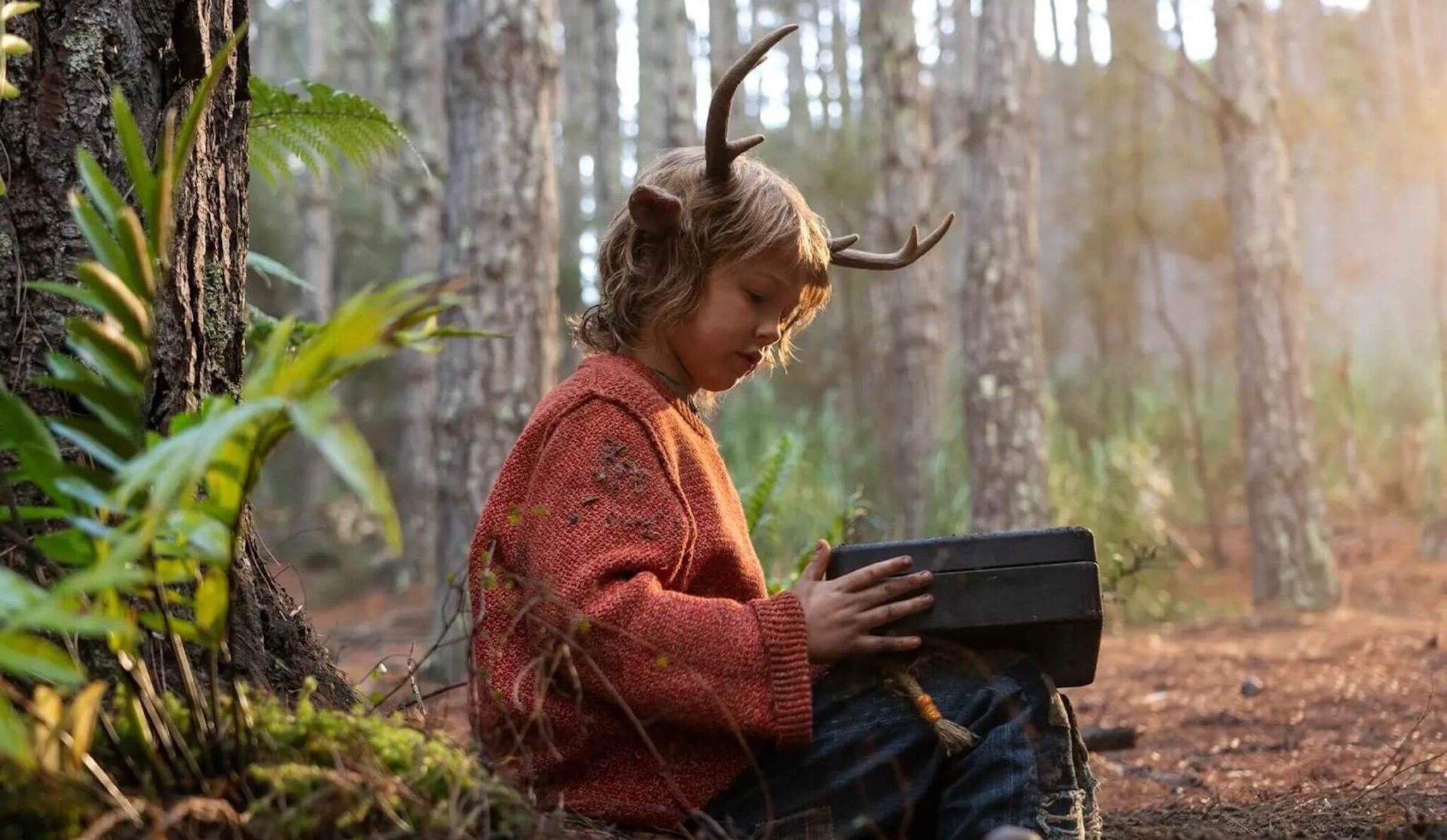
- Hidden Name
- Phone This field is for validation purposes and should be left unchanged.
Connect With Us
Writing competitions, success stories.
© 2024 ScreenCraft | An Industry Arts Company
Wait! Subscribe to get our free Newsletter
Join our community of over 100,000 screenwriters and get weekly inspiration delivered to your inbox.
Screenwriting Newsletter
Join our community of over 100,000 screenwriters and get weekly inspiration delivered to your inbox:
✓ Popular blog posts and industry news ✓ New ScreenCraft online events ✓ Screenplay competition announcements!
" * " indicates required fields
Kindlepreneur
Book Marketing for Self-Publishing Authors
Home / Book Writing / Character Prompts: 40+ Ideas to Flesh Out Your Cast
Character Prompts: 40+ Ideas to Flesh Out Your Cast
No matter what kind of writing you do, the strength of the story will come down to the characters. Every story is a human story, even if the characters are aliens, robots, trees, or animals. Which is why it's important to get the characters right.
To make them seem genuine, believable, and relatable. And this article on character prompts will help you do just that.
- The importance of round characters.
- Signs character prompts can help.
- A list of writing prompts to help you.
Table of contents
- How Important Characters Are to a Story
- When to Use Character Prompts
- Character Writing Prompts
- Getting to Know Your Market
The first Mission: Impossible movie was released in 1996, laying the foundation for the iconic film series still going strong today. But the version released to theaters wasn't the same version director Brian De Palma originally shot. Something was missing, and it was George Lucas who pointed it out to De Palma after a private screening.
If you'll recall (spoiler alert?!), the movie starts off with a mission — in which most of the team members are killed off in a shocking twist. Originally, De Palma went right into the action, thinking it would pull the audience in and engage them from the get-go. He was half right . As Lucas pointed out, there was no “Spaghetti Scene” that set up the characters and what their mission was. In order for the action to be exciting, the audience needed to get to know the characters a little bit beforehand.
Format Beautiful Professional Books
Easy to use, and and full of amazing features, you can quickly turn your book into a professional book.
One of the co-writers, David Koepp, wrote the scene and De Palma called the actors back in for a reshoot. In the final version of the movie, there's a scene where the team is sitting around the table, learning about the mission and bantering . They're not eating spaghetti, but the result is the same.
The added scene does two important things. It provides essential exposition and lets the audience get to know the characters a little bit before they unexpectedly die. It gives the unexpected deaths a level of shock they wouldn't have had otherwise.
This example is one of masterful storytelling. And it outlines the importance of character development . But you can't tell the audience who your characters are unless you know them first.
Getting to Know Your Characters
You can't have a good story without character and plot interacting. Even the most complex and interesting character is boring if there's nothing interesting happening that puts them to the test. So it's important to think of character in conjunction with plot , and how the two interact with each other.
Many authors find that creative writing becomes much easier when they have their major characters (or at least their main character) fixed well in their mind. Some authors do this as they write the novel or short story. Others like to get to know their characters before they sit down to write. There's no right or wrong way. But if you find yourself getting stuck wondering what your character would do in a situation, then it may be time to solidify your character a bit.
Sometimes, the plot doesn't seem to be working well, and you don't know why. This can happen when a writer tries to shoehorn a character into the plot, rather than letting the character “react” to the situation in a more natural way.
One of the biggest turn-offs for readers is when a character acts in a manner inconsistent with whey they know about them. There needs to be a very good reason for a character to act inconsistently or against their interests . (The teenage girl in the horror movie going into the dark basement when she could just leave the house, anyone?)
When you really know your characters, you can “allow” them to act naturally as the story progresses. And you don't have to become a discovery writer (aka pantser) to do this. You can still plot your novel out and have characters surprise you . In fact, sometimes the most exciting twist is one even the author doesn't see coming.
And getting to know your character with character prompts is a great way to facilitate this autonomy. Keep this in mind as you choose one or more prompts for your writing exercise.
Pro Tip: Before we get to the prompts, I'd be remiss if I didn't mention that there are other ways to get to know your characters. Creating unique character profiles is one great way. You can learn how to do it with our character profiles article .
Now, on to the prompts!
The following writing prompts can help you flesh out existing characters or even help you determine what you need to know about new characters. They can work for characters in different genres, but you may find some better than others for your specific fiction project.
Pick and choose the ones that sound interesting, or do them all! Either way, they are a great help in getting the ideas flowing.
1. What is your character's biggest flaw?
2. If your character got a speeding ticket, how would they react?
3. Write a scene in which your character is talking to someone they're attracted to. What do they say? Describe their body language during the interaction.
4. Write a scene comprising only dialogue in which your character is trying to convince another character to do something not in their interest.
5. Explore your character's way of speaking. Do they have an accent?
6. Does the character have a favorite expression?
7. Does your character curse when they're angry? Are there any curse words that they never say?
8. What is your character's greatest strength?
9. Where does the character come from? Where were they born?
10. Come up with three to five major events that helped shape the character's personality when we meet them in the book/story.
11. What's your character's biggest fear?
12. What, if anything, does your character feel inadequate about?
13. What is your character's favorite book? Why?
14. What is your character's favorite movie? Why?
15. What is your character's favorite song? Why?
16. Does your character play an instrument? Which one?
17. Does your character speak more than one language? Which one(s)?
18. Write a short story in which your character interacts with all their closest family members at a chaotic family function.
19. Is your character an optimist or a pessimist? Write a scene in which this is indirectly addressed.
20. Write 500 words inside your character's head. What is their inner monologue like?
21. What's the one thing your character wants most in the world? Peace? Money? Power? Love?
22. What kind of person is your character? Extrovert? Introvert?
23. Is your character a morning person or a night owl?
24. Write a scene in which your character goes grocery shopping but experiences increasingly frustrating inconveniences. Do they prepare for the trip with bags and a list? How do they respond to the setbacks?
25. Does your character have a recurring nightmare?
26. Does your character have recurring dreams?
27. Does your character have any neuroses?
28. What does your character spend their extra money on?
29. Write a scene in which your character finds themself in a room full of strangers. How do they react?
30. Your character comes across a homeless person asking for help. How do they react?
31. Is your character always on time? Write a scene in which they're late for an important meeting.
32. Who is your character's favorite fictional character? Why?
33. Write about your character's favorite form of exercise. Is it running, swimming, biking, lifting weights, or CrossFit?
34. Use one word to describe your character.
35. Write about the worst day of your character's life.
36. Real people are complex and often contradictory. Give your character one or two character twists that seem incongruous with their outward demeanor. Write a backstory for these character twists.
37. Does your character have any scars? How did they get them?
38. Does your character have any piercings or tattoos? What and where are they?
39. Write a “ save the cat ” scene with your character.
40. Is your character naturally talented, or do they have to work hard to learn new skills? How does this affect their personality?
Hopefully, these creative writing prompts have helped you flesh out your characters and, in turn, your story. Choose a favorite prompt or two and use them for characters in other stories, as well!
Pro Tip: If you have a great character but are struggling with story ideas, check out the story structure hub here .
Writing a great story with compelling characters is only half the battle . The next half comes when you get your story out into the world. And the best way to position your book for success is through the effective use of data. Luckily, this doesn’t have to be hard, and it doesn’t have to take long.
Just as getting to know your characters is important for writing a good story, getting to know your market is essential for getting your story in front of readers. There are a couple of ways to do this, but only one that leaves you more time for actual writing. And that means using Publisher Rocket, made by the team here at Kindlepreneur.
With Publisher Rocket , you can get data in seconds that would otherwise take you hours. The main tools allow you to:
- Learn what keywords Amazon customers use to search for books like yours — and how many searches a given keyword (or phrase) gets per month.
- See what's working for other authors in your genre with data on book prices, monthly sales, ranking, and book cover art.
- Find niche categories with the right amount of demand and competition for your books.
- Gather keywords to use in your Amazon Ad campaigns.
Check out Publisher Rocket here to learn more.
Dave Chesson
When I’m not sipping tea with princesses or lightsaber dueling with little Jedi, I’m a book marketing nut. Having consulted multiple publishing companies and NYT best-selling authors, I created Kindlepreneur to help authors sell more books. I’ve even been called “The Kindlepreneur” by Amazon publicly, and I’m here to help you with your author journey.
Related Posts
Top 8 best scrivener alternatives for writers (+ the only one that matters), scrivener vs. ulysses: which writing tool should you buy, scrivener coupons and discount codes (updated for 2024), sell more books on amazon, amazon kindle rankings e-book.
Learn how to rank your Kindle book #1 on Amazon with our collection of time-tested tips and tricks.
Join the community
Join 111,585 other authors who receive weekly emails from us to help them make more money selling books.

101 Character Writing Prompts
Author: Natalie Harris-Spencer Updated: June 8, 2023

In order to sell a book and get it published , you need to create a product, which, for most of us here at Aspiring Author , is a novel. And in order to write the darn thing (while lamenting your career choices), you need to live and breathe your characters. Character writing prompts can be an excellent way to help you get inside your characters’ heads and achieve that elusive narrative voice through speech, dialogue, or internal narration.
Creating real people
Creating convincing characters isn’t easy. Have you ever had that feeling that your characters are slippery, not quite sounding or doing the right things, or, worse, are fake? Have you noticed them steering their own way, diverging from your carefully outlined plot? Characters are the one device that should drive your plot – not the other way around. Follow them down whichever dark paths they choose in order to access the truth. Keep them honest and as grounded in reality as possible.
When it comes to creating 3D characters, Ernest Hemingway said it best: “When writing a novel, a writer should create living people; people not characters. A character is a caricature.” And to write real people, you need to ground your people in reality: real circumstances, real settings, and real thoughts and feelings. These character writing prompts have been designed to help you expose the human condition in all its imperfect glory. Humans are multi-layered (ah, the onion), with numerous internal complications, feelings, and flaws. Remember: characters have to change in order for the reader to care about them. They must go on a journey, through which your novel’s plot is the vessel.
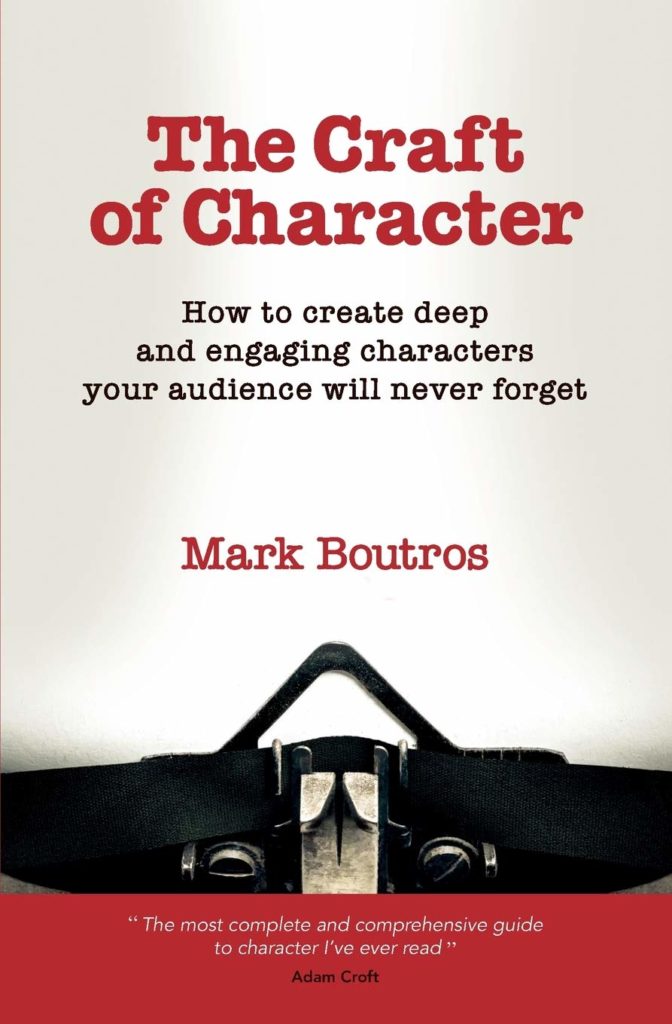
101 character writing prompts
Below are 101 character writing prompts that will help you deepen your understanding of your characters and elevate them from caricatures into real people. As you work your way through these character writing prompts, consider writing how your characters think, feel, but also change . Sameness is never interesting to read.
Physical appearance
- Does your character have any moles, birth marks, or beauty spots? Where? Describe them.
- Hair is not character. However, it can show something unexpected or unusual about your character. Write a scene featuring your character’s hair, without relying on the usual tropes (length, color etc.).
- Write what your character thinks they see when they see their reflection.
- Write a scene about your character in costume. What are they wearing, and why? How do they feel about it?
- What does your character’s coughing, sneezing, and hiccoughing sound like?
- What do they look like when they’re sick?
- What’s in your character’s wallet apart from money?
- Switch the gender of your character. How does that change how they think, feel, and move through the world?
- Write about your character getting their ears pierced or getting a tattoo.
- Describe your characters hands and feet.
- Show your character doing a workout. What are they wearing? How do they look before, during and after?
- Draw a sketch of your character’s passport. Does it help you understand who they are and where they come from?
Inner workings
- What is your character’s biggest flaw?
- What is your character’s biggest fear?
- What or who would your character kill for?
- What does your character want more than anything else in the world?
- What is the one thing that is stopping them from getting it?
- Write a therapy session between your character and their therapist.
- Write a scene without dialogue that shows exactly what your character wants – only through their actions.
- Show your character’s reaction to getting a parking ticket.
- Write a scene about a mental health challenge your character has faced.
- Put your character on a diet. How do they feel? What mood are they in?
- Write about your character being insatiable thirsty.
- Write about a time when your character couldn’t stop laughing.
- Using just dialogue, write a scene between your character and someone they’re attracted to.
- Your character is being lectured by someone in a position of authority. How do they react?
- Show your character making a selfish decision and the ramifications it has on their life.
- What is your character’s favorite book , and why? Has it always been the same book, or have their tastes evolved?
- Write a scene where your character can’t remember what happened the night before, and they’re trying to piece it together.
- Imagine your character is a nervous flyer. Document their thoughts during take-off.
- Write a recollection scene about the most frightening time of your character’s life.
- Show your character’s most embarrassing moment, either through recollection, dialogue, or action.
- Write a scene where your character is struggling to show or purposefully concealing their real feelings and emotions.
Family, relationships, and home
- How does your character spend their Christmas holidays, and who with?
- Write a scene with your character attending a family funeral.
- What are your character’s earliest memories? Do they remember their first home, their parents, or something else?
- Your character has a bunch of keys. What do they have as keyrings?
- Write an argument between your character and their mother and/or father.
- Describe a family portrait: who’s in it? Where are they now?
- Write your character’s bedtime ritual.
- Show your character having an argument with a family member at the dinner table. Do they win?
- What does your character’s closet and/or bedside drawer look like? What’s inside? Are they hiding anything they shouldn’t be?
- Write a drunk argument between your character and a family member.
- Imagine your character has a twin. List their similarities and differences, both physical and otherwise.
- Write about your character on graduation day.
- Write about your character going on a blind date.
- Your character is getting married. They choose an unusual wedding cake topper. What is it, and why is it important?
- Does your character want kids now or in the future? Why or why not?
- Write a scene where your character moves to a new town. Are they welcome? Why or why not?
- Write about a home invasion. Show your character’s possessions strewn and/or missing. What’s the first thing they check?
- Your character opens a letter not addressed to them, only to discover a secret about the previous resident. How do they react?
- Write a sex scene without mentioning anatomy (you can do it!).
- Put your character in a country where they don’t speak the language. How do they get by?
- Show your character meeting their first love again for the first time in ten years.
Epistolary character writing prompts
- Write a letter in your character’s handwriting.
- Write a Craigslist ad from the voice of your character.
- Write an Airbnb listing for your character.
- Write your character’s LinkedIn profile.
- Create an online dating profile for your character.
- Write a letter to your character’s younger self.
- Create a tarot card reading for your character.
- Come up with your character’s regular take-out order.
- Write out your character’s family tree, including dates of birth, marriage, and death.
- Write a postcard home from a far-flung destination.
- Write a journal entry from a pivotal day in your character’s life.
- Write a Valentine’s Day card from your character.
- Write your character’s weekly shopping list. Include one item that doesn’t go with the rest.
- Write a text conversation between your character and another person who they are trying to seduce or win over.
- Write two lies and a truth for your character. The lies should be as convincing as the truth.
- Write a scene with your character on the top of a Ferris wheel. What can they see? How do they feel?
- Write a scene with your character in a haunted house.
- Write a scene with your character falling asleep on the deck of a boat.
- Write a scene with your character in a station waiting room. Where are they going and why?
- Write a scene with your character in a hospital bed.
- Your character has just been discovered stealing a midnight snack. How do they respond?
- Write a scene with your character at a baseball game.
- Write a scene with your character at a fireworks display.
- Write a scene where your character is in a cemetery in the snow.
- Your character is going on a camping trip. What do they pack?
- Write a scene showing your character going into a church or place of worship.
- Write a scene at the top of revolving skyscraper restaurant.
- Your character makes a surprising discovery in a hotel room. What is it?
- Your character enters an antiques store. What trinket do they come away with?
- Write a scene where your character gets lost in a vineyard.
- Write a scene with your character on a boardwalk or pier.
- Imagine your character living in another decade. Now write about them – their clothes, their job, their desires.
Nature and animals
- What is your character’s favorite season and why?
- Write about your character ice skating on a frozen pond.
- What does your character see when they look up at the night sky?
- Is your character a cat or a dog person?
- Or do they have an unusual pet? Write about it!
- Write about your character accidentally hitting an animal with their car.
- Write about your character’s experience of dissecting a frog in a science lesson.
- What’s the first animal your character goes to see at the zoo?
- Your character gets stung by a bee. How do they react?
- Write a scene with your character sunbathing on a tropical beach.
- Write a scene with your character skinny dipping in a lake.
- Write a scene with your character watching the sun rise from a mountain top.
- Take your character for a walk in the woods when the light is fading.
- Describe the images, shapes, and patterns your character sees in passing clouds.
- Write a scene where your character is caught in a thunderstorm.
Of course, there are countless more character writing prompts that you can work on. We hope these 101 character writing prompts from Aspiring Author give you just enough to spark your writerly imagination and take your characters to multi-layered, unexpected, and very real places. And trust yourself that your characters can be strange, because the truth is almost always stranger than fiction.
Recommended reading
Here at Aspiring Author , we love recommending bestsellers and fawning over hot new releases. On this real time recommended reading list, you will find a list of top rated books on the publishing industry, craft, and other books to help you elevate your writing career.

The Craft of Research, Fourth Edition (Chicago Guides to Writing, Editing, and Publishing)

The Encyclopedia of Herbal Medicine & Natural Remedies: [10 in 1] Harness the Power of Nature to Improve Your Health With Over 300+ Herbal Remedies, Infusions, Essential Oils, Tinctures & Antibiotics

Creating Character Arcs: The Masterful Author's Guide to Uniting Story Structure, Plot, and Character Development

Is It Over?

Robert Frost: Sixteen Poems to Learn by Heart
About the author.
Natalie Harris-Spencer
Related articles.

How Many Words Per Day for NaNoWriMo

How to Combat Writer Imposter Syndrome

21 Best Plot Twist Books That Will Make You Say Wait…What?
Leave a comment cancel reply.
Your email address will not be published. Required fields are marked *
Save my name, email, and website in this browser for the next time I comment.

50 Character Development Writing Prompts
Last updated on January 5th, 2023
If you’re looking for some inspiration for your next creative writing project, why not try using some character development writing prompts? By coming up with creative and unique ways to develop your characters, you can ensure that your story will be more interesting and engaging for your readers.
From developing a character’s back story to exploring their motivations, these prompts should help you and your readers get to know your characters better and create characters that are more three-dimensional. By giving your characters prompts that help you understand them on a deeper level, you’ll be able to write them more authentically.
Plus, they can help you to break out of any writing ruts you may find yourself in and find inspiration. So if you’re ready to get started, here are some prompts to help you get inside your character’s heads. And if you are lucky, they might even surprise you!
What are writing prompts?

A writing prompt is a topic or question that is used to generate ideas for writing. As a writing exercise, character prompts specifically are used to generate ideas for writing about characters, and can be used for any type of writing, including fiction, non-fiction, and even poetry.
How do you use writing prompts?
There are many different ways to use character prompts. One way is to choose a prompt that focuses on a specific aspect of a character, such as their appearance, personality, or history. This can help to narrow down the ideas that are generated and can make the writing process easier.
Another way is to choose one that is open-ended and allows for a variety of ideas to be generated. This can be a great way to get the creative juices flowing, and can often lead to some very interesting and unique characters.
Whatever method you choose to use, they can be a great way to jump-start your writing and can help to create some truly fascinating and original characters.
Also, they may or may not lead to writing an actual scene that will be included in your story but will still give you more history of your character from which to draw.
Types of Character Writing Prompts
Things and objects.
When you are developing a character, you want to make sure that they are well-rounded and believable. One way to do this is to have them interact with their environment. What kind of things are in their environment? How do they react to them? Do they have any kind of connection to them? What does the object’s sentimental value say about the character who holds it dear? What kind of memories and associations does it bring up for them? All of these things can help to develop your character and make them more believable to your readers.
- A character is cleaning out their attic and finds a dusty old box. Inside are things that belonged to a person they used to be close to, but haven’t thought about in years. What objects are in the box, and what do they mean to the character?
- A character is going through a difficult time and finds solace in a particular object. What is the object, and why does it bring them comfort?
- A character inherits a piece of jewelry from a relative they never knew. What does the jewelry look like, and what does it mean to the character?
- A character finds a lost wallet on the street. What is the wallet’s owner like, based on the things inside it?
- A character is going through a tough break-up and decides to get rid of all of the things that remind them of their ex. What are some of the things they get rid of (or keep!), and why?
- A character is moving to a new city and has to downsize their belongings. What are some of the things they keep, and what do they mean to the character?
- A character is going through a difficult time and starts collecting random things as a way to cope and regain a sense of control. What kinds of things do they collect, and why?
- A character is going through their family’s things after a loved one dies and finds an old photograph. Who is in the photograph, and what does it mean to the character?
- A character is cleaning out their closet and finds a box of things they used to love as a child. What are some of the things in the box, and what memories do they bring back for the character?
- How does a character’s relationship to a thing or object change throughout the story? How does that reflect the character’s evolution and growth?
Personality
When developing a character, it can be helpful to explore their personality to get a better sense of who they are and how they might react in different situations. This can be done by considering their values, beliefs, and motivations, as well as their strengths and weaknesses.
- Your character is faced with a difficult choice and the consequences of that choice. How do they address it, or not? What did they learn?
- What’s your character’s biggest secret? What would happen if it was revealed?
- Your character tries out a new hobby and discovers they have a hidden talent for it. What is it? How does the hobby or that knowledge impact them?
- Your character encounters someone who challenges their beliefs or worldview. What is it, and does either character change?
- Write a scene in which your character tries out a new personality trait and it backfires hilariously.
- Write a scene in which your character’s personality is the perfect match for a situation, and they make the most of it.
- Write a scene in which your character has to restrain their personality for the sake of a professional setting.
- Write a scene in which your character’s personality gets them into trouble but they manage to talk their way out of it.
- Write a scene where your character has to fake a personality different from their own.
- Your character has a revelation about themselves that leads to a radical change in their personality.
Character Interactions
One way to develop a character in your writing is to explore interactions with other characters or creatures in the story. This can help you to understand how your character thinks and feels, and can also give your reader insight into how other characters may react to your character. Additionally, exploring interactions between characters can help to create conflict and tension in your story, which can make it more interesting to read.
- Have your character find a lost pet. What does this reveal about your character’s compassion for creatures?
- Have your character overhear a conversation between two other characters. What does this reveal about your character’s relationships with others?
- Have your character wake up in a room full of people they don’t know. What does this reveal about your character’s social anxiety or lack thereof?
- What does your character do when they first meet someone new? Are they outgoing or shy? Do they make a good first impression?
- How does your character act when they’re around someone they’re attracted to? Do they get tongue-tied or do they flirt shamelessly?
- In what ways does your character open up to others, and in what ways do they hold back? What do they reveal about themselves, and what do they keep hidden?
- What would happen if the character had to spend an entire day with someone they absolutely despised?
- Your character is at a party and gets into a heated argument with another person. What caused the argument, and how does your character react?
- Your character is at a museum and strikes up a conversation with the person next to them. What do they talk about?
- Your character is stuck in an elevator with someone they don’t know. How do they pass the time? What do they learn about the other person?
Places and Locations
Developing a character in your writing can be informed by exploring places and locations in the story in several ways. First, they can provide physical details about the character such as how they dress, and what kind of environment they are comfortable in. Second, they can also provide information about the character’s past, such as where they grew up or what kind of experiences they have had. Finally, places and locations can help develop the character’s goals and motivations, as well as create obstacles and challenges for them to overcome. By exploring all of these aspects of a character, you can create a well-rounded and believable character that will resonate with your readers.
- Develop a character who has a deep love for a certain place, whether it be a city, nature, or even an imaginary world. What is it about this place that draws them in?
- Your character is haunted by a specific location. This can be a place from their past that they can’t forget, or a place they’ve never been to but feel a deep connection to.
- Your character discovers a hidden room in their home that they never knew existed. What’s inside?
- Your character gets lost in a place they have never been before. How do they manage the situation and find their way back?
- Your character has to move to a new location and doesn’t want to leave their old home. How do they adjust to the new place?
- How did your character come to live where they do? Why do they stay?
- Your character visits a place that was significant to them in their past. What memories did it bring up? How did they feel?
- Your character stumbles upon a place that is the complete opposite of what they expected. What was it like? How did they react?
- Your character realizes they are homesick. For where? What do they do?
- What was the last place your character visited that left them feeling inspired? How long has that been?
Another way to develop a character is to explore their senses, or the senses of those around them to add another layer of depth to the story. For example, if a character is trying to figure out what another person is feeling, they might pay close attention to that person’s body language and facial expressions. Or, if a character is trying to remember a past event, they might focus on the smells and sounds associated with that event.
- Write a scene where your character is trying a new food for the first time and describe their reaction using all five senses.
- Describe the first time your character ever saw snow. How old were they? Was it in-person, in photos, or on TV?
- Your character’s child is learning an instrument. What does it sound like, and how do they feel?
- What is your character’s sense memory of a parent’s perfume or cologne? What feelings or memories does it trigger in them?
- Your character wakes up to the sound of someone else in the room. What is their first reaction and what does this say about the character’s paranoia or trust issues?
- The character bites their tongue and tastes blood in their mouth. Where in their past does this take them emotionally?
- The character smells something burning. What is their response, and what does it trigger in them?
- What does your character’s handwriting look like?
- How does your character respond to hearing their voice?
- Your character receives an electrical shock. What is the first word or sound they make?

I hope these help your characters take you somewhere unexpected, and you can learn about them along the way. What motivates them? What do they fear? What are their deepest desires? By exploring different aspects of your character’s personality, history and motivations, you can create well-rounded, believable, and compelling characters that your readers will love (or love to hate).
Still need even more inspiration? AI writing assistants have the ability to brainstorm with you, potentially providing endless prompts! Check out our Directory of AI Writing Tools and find one that fits your needs and budget… some even have free plans!

Contributing Writer
Molly Rittenhouse
Molly has a passion for writing and helping others improve their writing skills. She is a strong advocate for clear and concise writing, and she enjoys helping others find their voice and improve their writing. When she’s not busy writing, Molly enjoys spending time with her family and friends, exploring new places, and reading good books.
Related Posts

How to Write an Effective Expository Essay
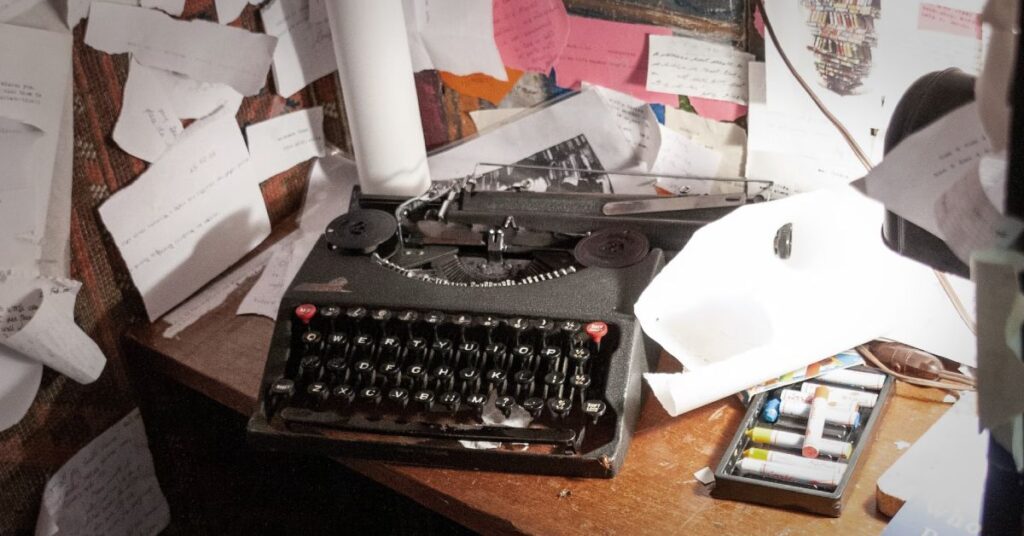
10 Essential Writing Tips for Aspiring Authors

How to Write in Third Person Without Losing Your Voice

The Character Comma
Writing tips for all things character and comma
Creative Writing Prompt List
Need a way to break out of writer’s block? Just want to further develop your characters? Search for something specific or browse your options!
If you’re looking for writing prompts, but don’t want to use the Writing Prompt Generator , then you’ve come to the right place!
This complete list of writing prompts includes everything from the Generator, but listed out and organized by prompt type.
Prompt List Navigation:
- Writing Craft Prompts
- Character & World Development Prompts
- Story Starter Prompts
- Dialogue Prompts
- Scenario Prompts
Writing Craft Prompt List
- Pick a scene in your novel. Write it from the point of view of a generic, unnamed background character.
- Pick a scene in your novel. Write it from a different character’s point of view.
- Find a dialogue-heavy scene of your story. Rewrite it as if it were an overly dramatic soap opera.
- Find a romantic scene of your story. Rewrite it as if it were a steamy, bodice-ripping romance.
- Think about your unfinished novel’s plot going forward. Fastwrite as many crazy “What if” statements as you can think of in a minute.
- Write a 1-page scene with BAD dialogue. Make it the WORST dialogue in the history of the world! When you’re done, rewrite the same scene with good dialogue instead.
- Pick a setting in your novel. Make a list of sensory details your character might experience at that setting. Write at least two for each of the 5 senses (sight, sound, taste, touch, smell).
- Think about a climactic moment in your story when your hero just barely wins. Write about what would happen if they lost instead.
- Rewrite a scene in 1st person instead of 3rd, or 3rd person instead of 1st.
- Write a short story that is EXACTLY 500 words. Only 200 of those words can be three letters or less. It’s hard, but this is an extremely powerful exercise in line editing and being very intentional in your writing!
- Everything in your story is the same, except swap the gender of each character.
- Write an interaction between two characters. Have the first sentence start with an A-word, the second sentence start with a B-word, and so on through the alphabet. Make it sound as natural as possible!
- Go to your bookshelf, close your eyes, and pick up the first book you touch. Open it to a random page and read the first full sentence. Write a scene that includes that sentence. (From Writer’s Digest )
Development Prompt List
- Your character just won the lottery. What do they do? What do they buy?
- It is the last page of your character’s story. What would they tell the first-page version of themselves if they had a chance?
- Write an apology letter to the character you hurt the most.
- Write a letter from your main character to an unbiased “pen pal.” Have them talk about what’s going on, justify what they’re doing, etc.
- Complete this sentence for your character: “The most terrifying thing in the world is…”
- Complete this sentence for your character: “The most important thing in the world is…”
- Complete this sentence for your character: “I was put here on earth to…”
- What are your character’s strongest talents? What unique skill sets do they possess?
- Why is your main character the main character? What do they add to the story that no one else can?
- If your character had a genie to grant them three wishes, what would they wish for?
- What does your character fear worse than death? What do they want so badly that they would die to achieve it?
- What is the WORST possible thing that could happen right now in your story?
- Law and justice work differently in different places. What does your society’s justice system look like? What are common punishments for criminals? Is the system reasonably fair, or thoroughly corrupt? (From Corvid Knowledge Hoard )
- Does your character have a trademark colour? Invert it. How does that effect your perception of the character? (From Corvid Knowledge Hoard )
- What does your character’s handwriting look like? Is there any significance to it? (From Writer’s Digest )
- Take your main character and place them into your current day job. How does the office respond? Does your character do a good job filling your place? (From Writer’s Digest )
Story Starter Prompt List
- She gives herself out to everyone, bits and pieces of her love and time and soul. She’s falling apart from self-made wounds, digging deep to give out more and more and more for people that don’t deserve it. (From Corvid Knowledge Hoard )
- For such a small town the crime rate was exceptionally high. (From Creative Writing Prompts )
- Destiny wasn’t going to run their lives. They would make their own decisions, no matter how stupid those would be. (From Creative Writing Prompts )
- Sometimes, being under a truth spell just means not being able to lie about being fine anymore. (From Creative Writing Prompts )
- For all the ugly things they had done, their entwined hands looked beautiful together. (From Creative Writing Prompts )
- It was strange to touch him without one of them dying. (From Creative Writing Prompts )
- She lived by 3 simple rules. 1. For the right money she’d kill almost anyone. 2. But never kids. 3. And definitely no dogs. (From Creative Writing Prompts )
- Some said the world would end in fire, some said in ice. Some people even said with zombies. But no one could have known that this was how it all ended. (From Creative Writing Prompts )
- The copy machine broke down in the middle of printing, which made this the third worst thing that happened this morning. (From Creative Writing Prompts )
- The night sky lit up for a second and what followed sounded a lot like the end of the world. (From Creative Writing Prompts )
- What had started as a friendly game of Simon Says quickly turned into a complete and utter disaster. (From Creative Writing Prompts )
Dialogue Prompt List
- “So that’s it? It’s over?”
- “In my defense, he was already dead when I got here.”
- “Can I just whoop your ass now?”
- “You have no idea who I am, do you?”
- “ How was I supposed to know it was haunted?”
- “I’m still way too sober for this.”
- “The more I love you, the more I hate you.”
- “I can’t believe I’d ever fall in love with someone like you.”
- “It’s things like these that keep me up at night.”
- “You can’t get rid of me that easily.”
- “We are all queens of our own kingdoms.”
- “You’re the worst thing that’s ever happened to me, and yet I don’t regret a moment of it.”
- “But if they think we’re a couple, we’ll get the couples discount!”
- “Can you please stop leaving dead bodies on my doorstep? You’re worse than a cat.”
- “I know I signed up for this and all, but… if I die, it’s still your fault and I will not hold back on blaming you.”
- “I can be sweet. Sometimes. To certain people. It happens!” (From Witter Prompts )
- “Normally, I’d have pushed you out the door by now, but you’re making a compelling argument with the bribery.” (From Witter Prompts )
- “I have fifty other excuses I could use. Do you want me to start alphabetically?” (From Witter Prompts )
- “Wow, fantastic. Now we can add stranded on top of our other numerous problems.” (From Witter Prompts )
- “Are you always this prone to bad luck and violence? If so, that’s kind of sad.” (From Witter Prompts )
- “I’m not going anywhere until you tell me why I saw you float through a wall.” (From Witter Prompts )
- “I am not grossly romantic. I am the right amount of romantic I’m required to be.” (From Witter Prompts )
- “What I lack in height, I make up for with my attitude.” (From Witter Prompts )
- “Rules? Nope, not listening. I’m not following them. Never have, never will.” (From Witter Prompts )
- “Not much of this makes sense. The markings are faded and I think some are missing.” (From Witter Prompts )
- “This whole ‘magic’ thing is going too far. There’s no way I’m able to do any of the things you’ve talked about and I think I would have noticed by now if I could.” (From Witter Prompts )
- “No pressure, honest. It’s not like the world is depending on you or anything.” (From Witter Prompts )
- “Wow. Here I thought we had a moment. I spilled my story to you and all you have to say is ‘okay’? What does that even mean ?!” (From Witter Prompts )
- “I don’t think this is the biggest mistake you’ve made. It’s probably like…the third worst.” (From Witter Prompts )
- “Our new neighbors are simultaneously the scariest and nicest people I’ve met.” (From Witter Prompts )
- “You’re so convinced that I’ll hurt them that you haven’t considered it’s the last thing I’d ever want to do.” (From Witter Prompts )
- “What I don’t want is any more experiments done in parts of my house. I found an ominous purple stain in my carpet yesterday and I know it was your fault.” (From Witter Prompts )
- “What have I told you about listening to your gut more? It’s smart. Do it.” (From Witter Prompts )
- “Aw, look at you, using fancy words at me. You’ve certainly grown up, haven’t you?” (From Witter Prompts )
- “Would you believe me if I said what you saw was a trick of the light?” (From Witter Prompts )
- “Shouting at each other across the room doesn’t count as having a proper conversation about your feelings. Wouldn’t you rather all of this be private, anyway?” (From Witter Prompts )
- “Didn’t we agree that you should keep your magic out of my house? Everything I own suffers when you try a new spell.” (From Witter Prompts )
- “I’m not letting karma deal with this. I can’t trust it’ll be enough of a punishment, nor can I say it’d be fast enough.” (From Witter Prompts )
- “You’d think I’d be embarrassed, but let’s be real with each other. I’ve done far worse things.” (From Witter Prompts )
- “If the duct tape doesn’t work, then I have no idea what else to do. You’re on your own after that.” (From Witter Prompts )
- “Don’t forget we’re enemies. I’m not letting anyone kill you but me, understand? Now sit still and let me bandage your side.” (From Witter Prompts )
- “Aren’t hunters supposed to kill monsters like us? Why are you helping me?” (From Witter Prompts )
- “Knowing what you know now, if you could go back. Would you do it? Kill xir before xe can ever do these things?” (From Corvid Knowledge Hoard )
- “There are fewer fortune-tellers than you may think,” says the witch. “I mean, tarot, sure. Predictions and unclear oracles of maybes. But actual knowing ? Nah, man, you can only do that if the Fates have blinded themselves to you.” (From Corvid Knowledge Hoard )
- “I want you to know how much I enjoy this. The taste of your blood, the smell of your fear. I could’ve let you go. But I’m doing this because I want to. There is no mercy here.” (From Corvid Knowledge Hoard )
- “Are you angry? I did not intend to hurt you, this I swear. I did not know how to not. But ignorance of the good doesn’t excuse the bad. I’m sorry.” (From Corvid Knowledge Hoard )
- “Xe lives off life energy, dumbass. It’s not like food- I know we compare it to a hunger a lot, but xir body literally cannot make itself live. Every moment that xe is not feeding, xe is dying. Do you think you could maybe ease off a little bit? It’s tough. I know xe’s not what you wanted, not the person you remembered but we’re doing our best.” (From Corvid Knowledge Hoard )
- “Bruh, I don’t know where you got the idea that I’m a good person, but if you want to keep it. Leave now.” (From Corvid Knowledge Hoard )
- “You’ve dragged me into this hellhole, but you can’t make me leave!” (From Corvid Knowledge Hoard )
- “So I think we’ve all accepted that I’m going to die at this point, but since you’re a historian can you at least make my death really cool?” (From Corvid Knowledge Hoard )
- “There’s something really funny about watching [villain] eat peanut butter with a spoon. During a battle. Because I can’t touch xir. Did I say funny? I meant infuriating.” (From Corvid Knowledge Hoard )
- “That’s the thing about X. Xe will claw xir way out of hell out of spite, but xe’ll throw xirself back in to save someone xe cares about.” (From Corvid Knowledge Hoard )
- “We’ll become legends. One way or another.” (From Creative Writing Prompts )
- “Am I a hero or the devil’s son? Can’t figure out what side I’m on.” (From Creative Writing Prompts )
- “So from the bottom of my cold, dead heart, screw you.” (From Creative Writing Prompts )
- “I’ve been the family disappointment for years! You can’t just suddenly show up at dinner and steal my rightful title!” (From Creative Writing Prompts )
- “I’m not saying this is all my fault, but I would be open to take a tiny bit of responsibility for this.” (From Creative Writing Prompts )
- “Last night I tried to imagine myself without you. The thing is, I could and I felt so much better.” (From Creative Writing Prompts )
Scenario Prompt List
- Two of your characters sneak down to the kitchen for a midnight snack. They bump into each other. Write that interaction.
- After getting hit by a car, your main character wakes up in an alternate universe surrounded by strangers. The entire life they knew before the accident had all been a dream.
- Assassins: After stalking her prey and tracking his movements for so long, your character has begun to fall in love with him.
- Assassins: Your character and his love interest are hired to kill each other.
- Assassin/Fake Dating: After being undercover as the target’s ‘girlfriend’ for several months, your character is ordered to finish the job.
- Your main cast is a team of reality TV ghost hunters. This time, the house is actually haunted.
- Fake Dating: Your character convinces their best friend/crush to a family gathering with them as their ‘date.’
- Fake Dating: Your character couldn’t stand the family gathering ‘you’re still single?’ ridicule, so she threw out the name of her crush… who happens to be a family friend, and is present at the gathering.
- Masquerade Ball: Your main romantic couple meets at a masquerade ball, and can’t recognize each other.
- Pirate/Mermaid: Your character is a merciless pirate, and she just wrangled her best prey yet. A mermaid.
- Soulmate: A red thread of fate connects your character to his soulmate. The threat cannot be broken, but it can stretch and tangle.
- Soulmate: There’s a timer tattoo on your character’s wrist that counts down to the moment she’ll meet her soulmate.
- Soulmate: When your character goes to sleep, in his dreams he can see the world through his soulmate’s eyes.
- Soulmate: Your character can see her soulmate in her bedroom mirror every night. They’ve never met in real life.
- Superhero: Your character is an undercover superhero. Their love interest is an undercover supervillain. The two know each other in real life, but DON’T know about each other’s secret identities.
- Superhero: Your character just found out that their best friend is destined to be the next Villain.
- Superhero: Your character’s superpower never manifested.
- When your character wakes up, he realizes he doesn’t even know his own name.
- While on vacation, your character’s parents call. They say to not bother coming home; they’re kicking your character out.
- Your character finds a craigslist ad looking for company for a cross-country road trip.
- Your character finds a craigslist ad looking for teammates for the upcoming Ultimate Ping-Pong Tournament.
- Your character follows a strange man into a back alley, hoping to buy drugs. But instead, he simply hands your character a gilded four-leaf clover (or another strange trinket/random object).
- Your character gets a call from a friend they haven’t heard from in years. The friend says that she’s about to become the next victim of a rampant serial killer, and your character is the only one who can help.
- Your character gets a call from a friend they haven’t heard from in years. The friend tells your character that she is the Chosen One.
- Your character realizes that she’s a fictional character in a novel.
- Your character wakes up to find that the person in the mirror is definitely not them.
- Your character’s future child appears, fully grown. The child says he went back in time in order to change the future, with your character’s help.
- Your character’s long-dead grandma appears out of the blue. She says your character is from an alien race that’s about to invade Earth, and they must return to the home planet for safety.
- Your character’s long-lost grandma arrives out of the blue. She says your character is actually royalty, and must take the throne of a country your character has never even heard of.
- Your character’s long-time crush just knocked on her door. He’s dressed as a pizza guy stripper, and he doesn’t realize he has the wrong address until it’s too late.
- Your villain’s main henchman just quit. Write about the villain’s secretary trying to find a suitable replacement.
- They haven’t seen each other in a long time, but Person A realizes they are still Person B’s emergency contact, when they get a call from the hospital. (From Creative Writing Prompts )
- Both heirs of the feuding countries do not want the war to go on and declare themselves madly in love with each other to stop their fathers’ pointless fighting. (From Creative Writing Prompts )
- Imagine your OTP where Person A doesn’t have a birthday so Person B says they are allowed to choose the date. And they choose a day that they associate with Person B. (From Creative Writing Prompts )
- Write about the day your character met their best friend. (From Writer’s Digest )
- Your character is absent-mindedly singing to himself, when suddenly the topic of the song comes true. (From Writer’s Digest )
- Your character is driving by rental car when they hear the thump of a flat tire. After pulling over, they realize the thump wasn’t from a flat. It’s coming from the trunk. (From Writer’s Digest )
About This Writing Prompt List
This writing prompt list includes 136 unique prompts!
Sometimes the prompts reference certain pronouns for better clarity, but don’t let that stop you from applying it to whoever you want.
Last updated: Added 15 new prompts on April 25th, 2021.
Writing Prompt Credit & Sources:
Most of the listed writing prompts are my own, but some were inspired by various places around the web and others were taken with permission by dedicated writing prompt blogs.
Credit and thanks to:
- Writer’s Digest
- Witter Prompts
- Corvid Knowledge Hoard
- Creative Writing Prompts
If you like what you see from one of these blogs, please go visit their site for more!
🎉 Our next novel writing master class starts in – ! Claim your spot →
WEEKLY WRITING PROMPTS
Join (probably?) the world's largest writing contest. Flex those creative muscles with weekly writing prompts.
Showing 2109 prompts
Begin or end your story with a character taking a selfie..
LIVE – Fluff
Write about a character who sees a photo they shouldn’t have seen.
LIVE – Dramatic
Write a story about a character who risks their life to take a photo.
LIVE – Adventure
Start your story with a character staring at a picture they don’t remember taking.
LIVE – Mystery
Center your story around a photo that goes viral.
LIVE – Funny
Write a story where time functions differently to our world.
Write a story about a character who wakes up in space., write a story from the point of view of a non-human character., write a story with a strong sense of place. how is the setting of your world the same as, but different to, our own, write a story imagining 'what if' one historic invention had never happened. how would our world be different now, start or end your story with a character who gets trapped inside a museum overnight., write about two characters who meet and/or fall in love in a museum., write about an art thief who is struggling to commit the perfect heist., write about someone who accidentally destroys a museum’s most valuable artifact., write about a gallery whose paintings come alive at night., write about a backstabbing (literal or metaphorical) gone wrong., start your story with an unexpected betrayal., set your story at a tense event where everyone is unsure whose side they’re on., write about someone who is stuck between two opposing sides and can’t decide which one to choose., write about someone who is convinced they’re going to be betrayed., win $250 in our short story competition 🏆.
We'll send you 5 prompts each week. Respond with your short story and you could win $250!
Contest #244 LIVE
Enter our weekly contest.
This week's theme: Oh Snap!
Prize money
Contest entries, closes at 23:59 - apr 05, 2024 est, recent contests ✍️.
#243 – Re-Imagining Our World Through Speculative Fiction with Alice McIlroy
#242 – Fine Art
#241 – Et Tu, Brute?
#240 – In the Wind
Recent winners 🏆
Niamh O'Dea – read
Liz Grosul – read
Jonathan Page – read
Gem Cassia – read
Leaderboard 🥇
#1 Zilla Babbitt
32350 points
#2 Deidra Whitt Lovegren
28678 points
#3 Abigail Airuedomwinya
22413 points
#4 Graham Kinross
14372 points
#5 Scout Tahoe
13195 points
#6 Chris Campbell
11010 points
#7 Thom With An H
10597 points
#8 Rayhan Hidayat
10210 points
#9 Michał Przywara
9869 points
#10 Deborah Mercer
9603 points

Bring your short stories to life
Fuse character, story, and conflict with tools in the Reedsy Book Editor. 100% free.
NEW VIDEO COURSE 🎉
How to Write a Novel
Join Tom Bromley for a writing master class and finish your first draft in 3 months . Learn more →
Explore more writing prompt ideas:
Adults Writing Prompts ⭢
Adventure Writing Prompts ⭢
Angst Writing Prompts ⭢
Character Writing Prompts ⭢
Christmas Writing Prompts ⭢
Dark Writing Prompts ⭢
Dialogue Writing Prompts ⭢
Dramatic Writing Prompts ⭢
Dystopian Writing Prompts ⭢
Fall Writing Prompts ⭢
Fantasy Writing Prompts ⭢
Fiction Writing Prompts ⭢
Fluff Writing Prompts ⭢
Funny Writing Prompts ⭢
Halloween Writing Prompts ⭢
High School Writing Prompts ⭢
Historical Fiction Writing Prompts ⭢
Holiday Writing Prompts ⭢
Horror Writing Prompts ⭢
Kids Writing Prompts ⭢
Middle School Writing Prompts ⭢
Mystery Writing Prompts ⭢
Narrative Writing Prompts ⭢
Nonfiction Writing Prompts ⭢
Novel Writing Prompts ⭢
Poetry Writing Prompts ⭢
Romance Writing Prompts ⭢
Sad Writing Prompts ⭢
Science Fiction Writing Prompts ⭢
Short Story Writing Prompts ⭢
Spring Writing Prompts ⭢
Summer Writing Prompts ⭢
Teens Writing Prompts ⭢
Thanksgiving Writing Prompts ⭢
Thriller and Suspense Writing Prompts ⭢
Valentine's Day Writing Prompts ⭢
Vampire Writing Prompts ⭢
Winter Writing Prompts ⭢
Oops, you need an account for that!
Log in with your social account:
Or enter your email:
50 creative writing prompts to enrich your craft
Creative writing prompts provide a useful way to jog inspiration. Try these creative writing exercises focused on individual elements of storytelling:
- Post author By Jordan
- 13 Comments on 50 creative writing prompts to enrich your craft

Creative writing prompts – find inspiration to:
Create compelling dialogue, craft vivid setting descriptions, create interesting characters, create strong story openings, master tense, craft more effective sentences and phrases, find story ideas.
- Create eventful plots
Craft satisfying story endings
1. a relocation.
Prompt: A character is moving to another city. She visits her favourite public place and sees something that makes her want to stay. Describe this in 500 words, using third person POV (he/she). Then rewrite in first person, using ‘I’.
Why: Rewriting third person scenes (especially emotional ones) in first person helps you find your character’s voice. You’re telling the reader what your character thinks as your character, not an observer. When you rewrite in third person (if you prefer this POV), some of this immediacy will carry over.
Prompt: A character is being chased by a villain or villainous group through an abandoned warehouse. Describe their fear and lucky escape in 500 words or less. Rewrite the piece from the viewpoint of the villain(s).
Why: Rewriting a protagonist’s scenes from the antagonist’s perspective can help you create a more realistic sense of threat, since you will be able to picture the protagonist as well as antagonist’s movements and psychological state clearer.
3. A late arrival
Prompt: A character arrives late to a party, not knowing that an old significant other is attending too. The relationship didn’t end well. The host introduces them to each other, unaware of their history.
In 500 words or less, write the scene and rewrite it twice, once from each character’s perspective: The late arriver, the ex and the host.
Why: Sometimes a story scene can be effective written from a secondary character’s point of view. Writing as a neutral observer might help you notice details worth including in the scene (such as the main characters’ actions and body language); actions that you wouldn’t think about as much if you were writing from a different viewpoint.

GET YOUR FREE GUIDE TO SCENE STRUCTURE
Read a guide to writing scenes with purpose that move your story forward.
4. A long affair
Prompt: A POV writing exercise courtesy of Writer’s Digest:
A teenage couple is sitting at a restaurant, playfully making up a fake Cosmo love test for each other. What questions do they ask each other? Now, write the same scene, but this time the couple is in their thirties. How would the questions differ? Write the same scene again, but this time the couple has been married for fifteen years. How would their questions be different than the other two tests?
Why: Character development makes your characters feel real. Rewriting scenes from the POV of younger and older versions of your characters will give you a sense of how your characters’ voices and concerns could change over the course of your novel realistically.
5. A change of view
Prompt: A detective is called to a small hotel to investigate the disappearance of a guest. Describe him searching the guest’s room in 500 words or less. Use first person POV. Then rewrite the scene in the second person (using ‘you’ to describe his actions, as though the reader were the detective).
Why: Although the second person is very uncommon as a point of view, writing a series of actions in second person can help you get into descriptive mode – you’re putting the reader immediately in the viewpoint character’s shoes, making them see and do exactly what your character sees and does.
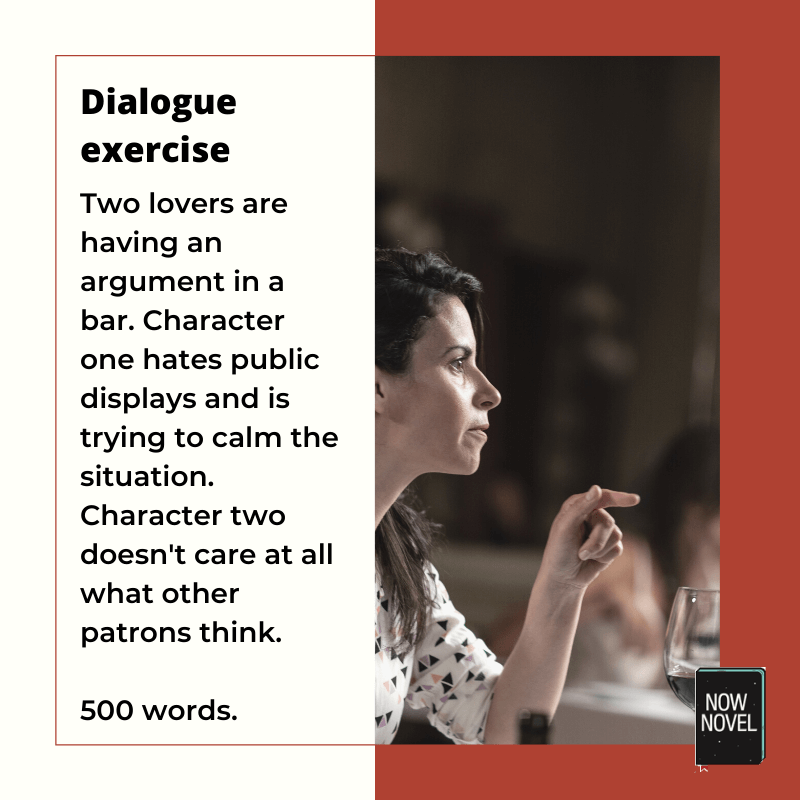
6. An argument
Prompt: Two lovers are having an argument in a bar. Character one hates public displays and is trying to calm the situation. Character two doesn’t care at all what other patrons think. Write their exchange in 500 words or less.
Why: Conflict in dialogue makes it lively and the raised stakes draw readers in. The point of this creative writing prompt is to remind you to include individual characters’ differing psychologies and likes and dislikes so that each character’s voice is distinct.A new tag
7. Remove dialogue tags
Prompt 7: Take several lines of dialogue (either your own or another writer’s work) that use dialogue tags (‘he said’, ‘she said’).
Rewrite the exchange without any dialogue tags, describing each character’s body language (e.g. crossing arms, pacing back and forth, sitting down, standing up) between their spoken lines instead. (E.g. “You said the same thing yesterday.” She crosses her arms, leaning back.)
Why: Dialogue tags can be distracting and repetitive. Body language can show how your characters are speaking and feeling without telling the reader outright, and this brings characters to life.
8. A public figure
Prompt: A public figure (a celebrity or politician) is giving a long speech when they are interrupted by a member of the audience and heckled. The speaker loses their calm and responds to the heckler in far more informal speech.
Why: We use different ways of talking depending on whom we address. Creating sudden shifts in how a character talks in scenarios such as this helps us remember to vary a character’s expression according to their circumstances.
9. An elevator pitch
Prompt: Two characters have been stuck in a lift for an hour. They were strangers but they begin opening up, telling each other about their lives while they wait for assistance. Their conversation is awkward at first but by the end it’s as though they’re old friends. Use 500 words or less.
Why: Creating a sense of progression in dialogue shows change and this change and sense of development is a large part of what makes a story interesting.
10. A group project
Prompt: . Four college students have been put in a group to compile a report. Each has a very different work approach. One student loves to research first, another likes to organize people and delegate tasks, one is a lazy slacker and one just agrees with everyone else to avoid conflict. Write their argument about how to complete the project.
Why: It’s important when writing multi-character scenes to give each character a voice that corresponds to their immediate goals as well as personalities. This exercise will help you create multi-character scenes that are complex and rich with dramatic potential.
[Try extra character writing exercises here for further practice.]
11. A lone hiker
Prompt: Imagine your character has gone hiking in a forest on a mountainside. There is nobody else around. Describe what they hear as they pass through different parts – a densely wooded area, a stream, and a high ravine.
Why: Often when we write setting we rely on visual description almost exclusively. Creative writing prompts that help you invoke the other senses will help you create fuller mental imagery for readers.
12. A city changes
Prompt: Describe the general goings-on in a city over the past 100 years. In the course of your description, describe at least one major landmark that’s changed as well as one memorable event that residents won’t soon forget.
Why: Writing setting well, especially in historical fiction, requires showing place as dynamic rather than static. The process of time changes a place and showing these changes occasionally makes your novel’s locations feel real.
13. A sailor’s impressions
Prompt: Describe a seaside city from the viewpoint of a traveler who is visiting for the first time. Describe the same place again from the viewpoint of a local. Think about the different places in the city each would find interesting, and have each character list three things they love and three things they hate about the city.
Why: Characters’ relations to places affect what they notice about them and where they go, and the same place in your novel can have multiple qualities depending on whose POV is being used. A visiting character might end up eating at awful tourist-bait diners, for example, while a local is more likely to avoid these.
14. A house changes
Prompt: Describe a big, rambling house in the daytime and make it seem comfortable and homely. Rewrite the piece, keeping everything except the adjectives the same. Change the describing words you use so the house feels sinister, eerie or outright terrifying.
Why: In setting, time of day and place work together to establish mood and atmosphere. This exercise will help you show how places take on different characters according to the conditions under which we experience them.
15. A character’s refuge
Prompt: Imagine your character has a favourite place they escape to whenever they feel stressed or need quality alone time. It could be somewhere in nature or else an inner city café, music hall or public library. Describe this setting in 500 words including at least three of senses: smell, touch, sound, sight or taste.
Why: Involving the reader’s senses in your settings makes your fictional world easier to imagine. We form memories of places not just through vision but the other senses too. Do this exercise regularly to create memorable locations for your story.
16. A Mary Sue
Prompt: Describe a character who is loved by everyone (if you’ve seen the cult classic show Twin Peaks , Laura Palmer is a good example). Describe the character and what is so lovely about her in 500 words or less, but end with a secret or flaw that not everyone sees.
Why: Story characters who are perfect are boring. Great characters are light and shade. ‘Good characters’ can have flaws and ‘bad’ characters can have pasts that show the reader a human side. The villain Lord Voldemort in J.K. Rowling’s Harry Potter series was once an ordinary boy.
17. A police line-up
Prompt: Imagine a character who witnessed a crime has to identify the perpetrator in a police line-up. Each of the suspects is quite similar looking but there is one vivid aspect of the guilty party that stands out. Describe your character noticing this stand-out feature and realizing who the guilty suspect is in 500 words or less.
Why: When we describe characters, we often reach for the most obvious physical features such as hairstyle and eye colour. But these are seldom particularly identifying and can read as clichéd. When readers could spot your characters in a police line-up, you’ll know they are vivid. [Someone on Tumblr used forensics software to put together sketches of famous literary characters based on their descriptions: See more here ].
18.A formative experience
Prompt: Imagine a character who has a single, over-arching goal in his or her life (it could be the quest for money or love, status or acceptance, for example). Now describe a single event from your character’s life that strongly influenced their adopting this goal. Describe the event from the character’s viewpoint as a memory, in 500 words or less.
Why: Even if you don’t explicitly mention a character’s entire backstory in your novel, knowing details about why your character wants and strive for specific things will help you create a three-dimensional cast for your novel.
19. An intriguing voice
Prompt: Go to YouTube. Click on a random video and quickly minimize the window before you see anything. Describe the voice of the first person you hear speaking, in detail. Is there any defining characteristic? Is it low, high, raspy, clear? Do they have a stutter or an odd way of starting, pausing, or ending sentences? Begin with ‘Her/his voice is/was like…’
Why: Thinking about the differences in how people sound and express themselves will help you write characters whose voices are unique and interesting.
20. A metamorphosis
Prompt: It’s fun to ask yourself questions such as ‘if my character were an animal/song/building/food item, what would they be?’ Imagine a character in her mid 40’s who’s a schoolteacher. Her class loves her because she’s a bit odd and quirky. Now answer these questions:
If my character were an animal what would she be and why?
If my character were a song, what would it be and why?
Why: Creative writing prompts that involve asking questions about imaginary people help to create a more concrete idea of them in your mind’s eye. Even if your reader doesn’t know every little thing about your character, you should have a very deep understanding of them yourself so that, if they’re faced with a specific situation, you will already have some intuition as to how they will react.
21. A dramatic incident
Prompt: Begin an opening sentence with a character having died. For example, Faulkner begins his acclaimed story ‘A Rose for Emily’ thus:
When Miss Emily Grierson died, our whole town went to her funeral: the men through a sort of respectful affection for a fallen monument, the women mostly out of curiosity to see the inside of her house, which no one save an old man-servant–a combined gardener and cook–had seen in at least ten years. William Faulkner, ‘A Rose for Emily’. Available online here .
Why: Dramatic story openings that leave things unanswered pull the reader in. How exactly was Miss Emily a monument? Why is she so intriguing to the town and why had nobody seen the inside of her house? How did she die? Faulkner leaves many questions to answer in the course of the story.
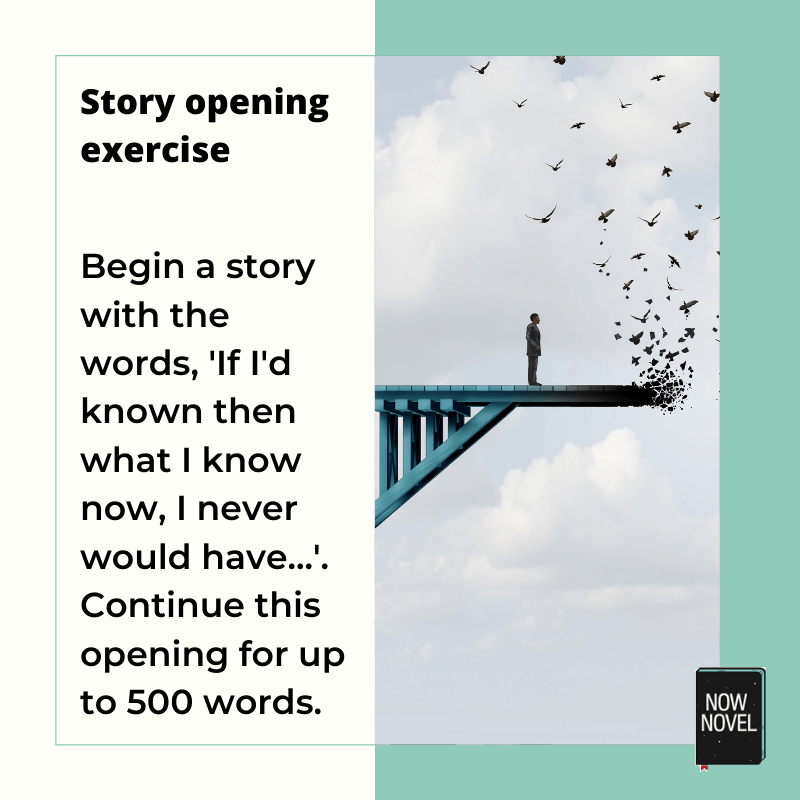
22. A narrator’s regret
Prompt: Begin a story with the words ‘If I’d known then what I know now, I never would have…’ Continue the opening for up to 500 words.
Why: Conditionals (if, would, could, etc.) create a question in the reader: ‘Then what?’ Beginning a story with a character talking about having grown or acquired new knowledge in some way makes it clear to the reader that there has been momentous change of some kind, and change is what creates story.
23. An uncommon birth
Prompt: Begin a story ‘I was born…’ Many classic novels that are bildungsromans (stories about coming of age) follow this format (e.g. David Copperfield by Charles Dickens and Midnight’s Children by Salman Rushdie).
Why: Great characters have history and can remember (and are driven to some extent by) important life events. You don’t have to give your character’s life history from the day they were born. But write a list for each character in your novel about important events in their life, even if we only meet them when they are in their thirties.
24. A strange action
Prompt: Begin a story with a surprising or unusual action. For example, ‘I rushed around the house in terror, turning every tap on full’.
Why: The mundane and everyday can happen in the course of your novel. But keep the most mundane parts of your book for any part but the beginning. An unusual or inexplicable action as an opening creates curiosity.
25. An encompassing idea
Prompt: Write a first line that encompasses the whole of a story idea. For example, the first line of The Lord of the Rings written this way could be ‘I had been to Mount Doom and back, and everything in the Shire had changed.’ This great exercise was suggested by Joe Bunting of The Write Practice in his post on writing great first lines .
Why: Being able to condense your story into a single line is a good skill to have. It’s often best to write the first line of your novel once you have finished your first draft, too, and once you have all the details of plot you’ll be especially able to find an opening that encompasses the central ideas your book covers.
26. A marriage day
Prompt: Imagine a character describing her wedding day. Describe how she and her future spouse walk down the aisle and how she feels about the occasion, all in the present tense and first person plural (‘we’). Then rewrite the passage in the future tense (‘We will’).
Why: Different tenses and moods have interesting effects (e.g. the subjunctive mood is used to describe hypothetical situations – ‘if I had been president, I would have…’). Rewriting an important event in the future tense can show a character’s longing or the castles in the sky they are building. Writing the above scenario this way can be very effective if you will later show how the event did not go to plan at all. It will let you create a contrast between expectation and reality and this element of surprise is a satisfying component of storytelling.
27. A revelation
Prompt: Your character is a high school student who has just sat his exams.
Describe the exams he has completed in the recent past tense (e.g. ‘Yesterday, I wrote history and my pen ran out of ink in the middle of the French Revolution’).
Now rewrite the piece in the past perfect (past perfect tense shows actions that are complete, e.g. ‘I had walked to the exam venue at 8:00 am.’) End the rewrite with a revelation that came on the last day (for example, the entire class had to re-sit the exam because there was a mix-up with question papers).
Why: Past perfect tense is useful for creating anticipation, because it shows something happened before something else . The reader says to herself ‘I see that all these actions have been completed, so what are they leading to?’ Mastering past perfect will help you create a more complex sense of time and chronology in your novel.
28. An interview
Prompt: Describe a character waiting nervously outside a venue for a job interview. Describe what they are worried they will be asked and in what ways they feel prepared. Write in recent past tense, ending with ‘the door opened’. After this, rewrite the same scene in the present progressive tense (beginning ‘I am sitting outside….’ and ending ‘the door opens…’)
Why: It is important to be consistent with tense in a single section of your book or scene, unless transitions between tenses are logical and easy to follow (for example, a character shifting from sharing a memory to describing a present action). Mastering ‘present progressive tense’ (the tense using present participles that shows immediate, current action) will help you create active scenes that unfold in front of the reader.
29. A five-year plan
Prompt: Describe a character making plans for where they will be in life when they reach 30. Make several uses of the future perfect tense that indicates an action that will be complete in the future (e.g. ‘I will have finished studying’).
Why: Characters, like real people, project themselves into the future, imagining when certain tasks or undertakings will be finished and what their achievements will look like. Future perfect tense shows that the narrator’s current situation has a definite end-point, making it clear that your character is in a state of transition. This helps to create a sense of both shorter time and longer time scales in your novel.
30. An unexpected visitor
Prompt: Begin a story about an unexpected visit with the words ‘I had not been expecting anyone, but…’ Use the past perfect progressive tense (‘I had been [working/walking/thinking/waiting/missing]’) at least two more times in the exercise.
Why: The past perfect progressive tense is used to describe a continuous action that was completed in the past. It’s useful for writing about interruptions because there is an implied ‘but’ or ‘when something else happened’. For example ‘I had been reclining by the pool with my eyes closed when I heard an unfamiliar voice.’
31. An imperfect copy
Prompt: Open a favorite book to a random page and pick a paragraph. Copy out the paragraph but change every adjective to a synonym. Compare the two versions and note any differences in connotations. For example ‘green’ describes the color, but ‘verdant’ describes the green of lush vegetation or grasslands specifically.
Why: When you rewrite, finding more descriptive alternatives for words that perhaps aren’t carrying enough weight will make your writing more vivid.
32. A marathon
Prompt: Write a scene where your main character is running a competitive marathon. Describe her progress and feelings as she nears the finish line. The first time around, use adverbs (e.g. ‘I ran quickly around the bend in the road’), then rewrite using descriptive verbs instead of verb-plus-adverb (e.g. ‘I hurtled/sprinted’, instead of ‘I ran quickly’).
Why: Adverbs tell the reader how an action is performed, while active verbs show that specific quality of action more imaginatively.
33. A synonymous exchange
Prompt: Write a scene between two characters who are out on a date at a restaurant. They mirror each other’s gestures from time to time in a subconscious display of affinity. For the first pass, use the same words for these gestures (e.g. ‘She smiled at me as she returned from the restroom and I smiled back.’) The second time around, take all the double words (e.g. ‘smiled’ and ‘smiled’) and replace one with a synonym so there is less repetition.
Why: Sometimes it is hard not repeating the same word in short succession or you do so intentionally for effect. Yet using the same describing words within a short space of time for different objects or actions can feel amateurish and repetitive to readers. Use this exercise to practice creating variation and to expand your repertoire of useful synonyms.
34. A precocious child
Prompt: Write a scene in which your main character is talking with a precocious child who uses big words a lot (such as ‘precocious’, meaning showing certain abilities or interests at a younger age than the norm). Then go through the scene and find the shortest possible alternative for every longer word. An alternative to ‘precocious’ could be ‘clever’.
Why: Learning to simplify your writing and strip it down to its most basic meanings is important for becoming a good editor. Before you can write great ornate prose, you need to have a good sense of how to write simply and sparingly.
35. A letter
Prompt: Write a scene in the passive voice, where a character receives bad news in a letter and describes being given the letter and reading it. For example, ‘The letter was given to me yesterday.’ Then rewrite the whole scene in the active voice, where the character is in the subject position: ‘I received a letter yesterday.’
Why: A lot has been written about using active voice rather than passive voice. Passive voice can be used intentionally to create the impression that a character is fairly passive in their life and pushed and pulled by others. Generally, though, active characters are interesting to read about because we have a sense of their actions being purposeful and driven by some or other immediate goal, and that creates stakes that arouse interest.
36. A newsworthy hook
Prompt: Go to Google search and click on ‘news’, then type in a single word. It can be the name of a place, a colour, a job description. Then use the first line of the top result to begin a story and continue for 500 words. For example, for ‘purple’ the current result is ‘Jimi Hendrix would have been perfectly comfortable with the purple haze of uncertainty that surrounds many of the Liberal government’s most pressing agenda items.’ Granted, it would be an odd story, but you could write speculative fiction about Jimi Hendrix returning from the dead to be a guitar-playing political commentator.
Why: News articles are a great source of story ideas, from the ordinary to the bizarre.
37. A chance find
Prompt: Open a favourite novel to a random page. Use the first 5-7 words of the first complete sentence to begin writing a story. For example, from Haruki Murakami’s The Wind-up Bird Chronicle: ‘I was going to beat him…’
Why: Other writers’ books are filled with great turns of phrase. A single image or action can spark your imagination and start off an interesting story.

38. An autocomplete
Prompt: Go to Google search and start typing in a phrase beginning ‘What if’. Look in the auto-complete suggestions that pop up (for ‘what if everyone was’ a suggestion is ‘what if everyone was vegan’). Write a story opening up to 500 words long that explores this idea in greater detail.
Why: Many great stories and novels branch out from a simple premise. For example, C.S. Lewis’ great fantasy novel The Lion, the Witch and the Wardrobe starts from the question ‘what if there were another world where animals could talk and we could reach it through secret portals?’
39. A blind stroke of luck
Prompt: Open a dictionary to a random page five times, close your eyes and land your finger on a random word. Write each of the five down and try to combine them into a story idea. For example, for ‘alternative’, ‘full’, ‘discovery’, ‘critic’ and ‘original’, you could come up with ‘A critic obsessed with Kafka makes a discovery – a drawer full of alternative original drafts of stories that seem to give a cryptic message.’
Why: Using random techniques can jog your creativity and help you find curious combinations of subject matter you’d never normally dream of writing about.
40. A song to start it all
Prompt: Take a playlist on a music streaming service or your own device and select shuffle.
Press play and use the words of the title as either the opening of a story or to create the main idea. For example, the words ‘Love Will Tear Us Apart’ (the title of a song by the band Joy Division) could be words a character thinks in a story about an unhappy love affair.
Why: Songs are great sources of writing inspiration because they are often ambiguous and allow us to fill in the gaps using our own imaginations.
Create eventful plots
41. a great win.
Prompt: Write a scene in which a person wins the lottery. Describe their excitement and the lead-up to claiming their ticket, and the moment that they find out that they got the date of the draw wrong and didn’t win anything after all.
Why: The ‘reversal of fortune’ is a common ingredient of tragedy and drama. Practice writing about reversals of fortune to improve at creating the rising and falling action of dramatic moments in your stories’ plots.
42. A prophecy
Prompt: Write a scene in which a prophet comes to a village and shares a premonition that throws the townspeople into turmoil. Describe how a main character decides to set about resolving the situation.
Why: The catalyst for your story, the inciting event that sets it in motion, needs to create tension (whether between characters or within one character) that begs resolution. This exercise will help you practice creating action-centered story beginnings.
43. A betrayal
Prompt: Write a scene in which two old friends have a fight that threatens to dissolve their friendship for good. It could be a fight over a clash of values or a personal betrayal. Towards the end, show that there is a glimmer of hope that they will reconcile.
Why: Conflict (whether internal or between characters) is the lifeblood of great plots. If everything is easy and straightforward for your characters, the stakes are low and the reader invests less emotionally.
44. An adoption
Prompt: A woman has been searching for her birth mother for years because there are important questions she needs to ask her. She’s finally found the right address and has made contact, and the woman has invited her over. Start with ‘She rings the bell’ and describe their interaction for about 500 words.
Why: Climactic plot moments are opportunities to create suspense and resolution. Isolating and practicing writing moments of plot revelation will help you handle moments of truth creatively and assuredly.
45. A new piece of evidence
Prompt: A detective has been on the hunt for a notorious killer for years. He’s finally tracked him down to a hideout and the detective manages to cuff and arrest him. But while combing through the killer’s hideout, the detective makes a shocking discovery that opens a whole new chapter. Write an ending for this story that also suggests the beginning of a new plot line.
Why: Writing a book series is challenging, and knowing how to create new arcs even as you resolve major ones helps to keep readers invested in seeing what your protagonist will face next.
46. A late pardon
Prompt: A man imprisoned wrongly for a crime is released after 20 years. He’s lost touch with his family. Describe his surprise homecoming in 500 words or less.
Why: Dramatic stories that carry a lot of emotional weight need to be resolved satisfyingly. If your protagonist has suffered immensely, the ultimate deliverance should read as comparatively immense. This exercise will help you find dramatic story endings for dramatic beginnings.
47. A better ending
Prompt: Take a novel that had an ending you found unsatisfying. Rewrite the ending and change elements so that you’re happy with the outcome.
Why: Sometimes writers make choices that upset us. We finish thinking ‘there was so much promise, and then they went and did that ‘. So practice writing endings that satisfy your expectations of a book so that you are best equipped to satisfy your readers’ own.
48. An educated guess
Prompt: Read the first paragraph of a short story or novel, then close the book and write a final paragraph.
Why: Many story openings give a clear sense of what the general themes and preoccupations of the book are. It’s important that the opening and closing of your book resonate with each other, so practice writing these two parts together as an exercise.
49. A top-rated finale
Prompt: Take a favorite television series or movie. Make up your own ending based on what you can remember of the plot line and characters.
Why: Using TV shows and movies as inspiration is effective because screenwriters are especially well-versed in strong beginnings and openings. Practicing an exercise like this will help you think like a screenwriter in how you craft compelling story endings.
50. A blank slate
Prompt: Create your own prompt for writing a story ending and post it in the comments below
Why: Coming up with prompts is a valuable creative exercise in itself.
Find daily writing prompts with exercises to practice literary devices and craft.
Try easy, step-by-step prompts that will help you outline your novel and support to see you through the challenging first draft.
Related Posts:
- Daily writing prompts: 365 ways to practice craft
- Character archetypes: How to enrich your novel's cast
- Creating your own budget MFA in Creative Writing
- Tags writing exercises , writing inspiration , writing prompts
Jordan is a writer, editor, community manager and product developer. He received his BA Honours in English Literature and his undergraduate in English Literature and Music from the University of Cape Town.
13 replies on “50 creative writing prompts to enrich your craft”
This is an amazing list! I love the fact that you listed a “why” after each exercise, it really helps to focus the mind. I’ve included a link to this post in my latest blog post on https://elisabethannewritesthings.wordpress.com/ I hope you don’t mind! If you do, let me know and I will take it down, but I thought it would be great to share it with other people.
Thanks, Elisabeth. Not at all, I’m glad you liked it and grateful for the mention. B.
[…] you are struggling to come up with ideas to write about daily, these great writing prompts will inspire you and maybe take your writing in a new […]
Writing prompts has a great significance. It helps the readers come to know the goal of writing the article.A single word, a single line even a picture can be the writing prompts.So, we should be more creative to write a writing prompts.It must be clear, concise and focused.Nowadays, many paper writing service, online writing schools help us to learn writing prompts. Here you have shared fifty real life example of writing prompts. These examples must help us to write a great prompt. Thank you for sharing.
Hi Cody, it’s a pleasure. Thank you for reading!
I wrote a short story based on the first one, and I didn’t follow it exactly but I am really happy with it. I plan on having my friends edit it. I love the why it helps me understand what the point of it is besides just typing words. Thankyou
It’s a pleasure, Emilie. I’m glad you found it inspiring. Good luck with your story!
There are some amazing ideas here! So glad I found this list, you’ve really got me thinking! Thank you 🙂
I loved the prompts as well as the structure of your post! It certainly gave me some food for thought…I was wondering if there’s some way to get feedback on what I write using these prompts, though…is that possible?
Thank you Ananya, I’m glad you enjoyed this article!
You can share pieces for feedback from peers in our members-only writing groups. You can sign up here: https://www.nownovel.com/users/sign_up
Fantastic. Thank you.
It’s a pleasure, Tinka, thank you for reading!
[…] Look no further than http://www.nownovel.com/blog/50-creative-writing-prompts/ […]
Leave a Reply Cancel reply
Your email address will not be published. Required fields are marked *
Pin It on Pinterest
- Skip to main content
- Skip to primary sidebar
EveryWriter
A New Community of Writers
100 Character-Driven Writing Prompts
March 19, 2024 by Richard 1 Comment
100 Character-Driven Writing Prompts: Character-driven stories are the heart and soul of great literature, captivating readers by delving deep into the minds, emotions, and motivations of the protagonists. These stories focus on the inner lives of characters, exploring their struggles, growth, and relationships as they navigate the challenges and triumphs of their journeys. By placing characters at the forefront, writers can create narratives that resonate with readers on a profound level, fostering empathy, understanding, and self-reflection.
Crafting compelling character-driven stories requires a keen understanding of human nature and the ability to create multi-dimensional, relatable characters. Writing prompts that focus on character development can be invaluable tools for writers seeking to hone their skills and explore new creative avenues. These prompts encourage writers to delve into the psyches of their characters, unearthing their fears, desires, and secrets, and bringing them to life on the page.
The following list of 100 character-driven writing prompts is designed to inspire writers of all levels, from novice to experienced. These prompts span a wide range of genres, from science fiction and fantasy to contemporary fiction and mystery, ensuring that there is something to spark the imagination of every writer. Each prompt presents a unique scenario or character archetype, inviting writers to explore the depths of human experience and craft stories that will resonate with readers long after the final page is turned.
By embracing the power of character-driven storytelling, writers can create works that not only entertain but also enlighten, challenge, and transform readers. These 100 writing prompts serve as a springboard for creativity, encouraging writers to push the boundaries of their imagination and craft stories that celebrate the complexities and beauty of the human experience. So, whether you’re a seasoned author or a budding writer, dive into these prompts and let your characters guide you on an unforgettable journey of self-discovery and storytelling magic.
- A retired spy is pulled back into the world of espionage for one last mission.
- A time traveler falls in love with someone from the past.
- A child discovers they have magical powers and must keep them hidden.
- A therapist begins to suspect their patient is a dangerous criminal.
- A robot learns to feel human emotions and questions its purpose.
- A ghost watches over their living family members, unable to communicate with them.
- A world-renowned surgeon loses the ability to operate and must find a new purpose.
- A politician leads a double life as a vigilante by night.
- A woman wakes up with no memory of her past and must piece together her identity.
- A chef inherits a mysterious cookbook with recipes that have strange effects on people.
- A homeless man discovers he has the ability to see the future.
- A successful businesswoman is forced to confront her humble beginnings.
- A soldier returns home from war and struggles to readjust to civilian life.
- An alien disguised as a human falls in love with an earthling.
- A parent’s worst fear comes true when their child goes missing.
- A writer’s characters come to life and demand a different ending to their story.
- A hitman falls in love with his target and must choose between love and duty.
- A scientist accidentally clones themselves and must deal with the consequences.
- A time traveler tries to change a historical event but makes things worse.
- A doctor discovers a cure for a deadly disease but realizes it has terrible side effects.
- A politician’s scandalous past catches up with them as they run for office.
- A famous actor is haunted by a ghost who claims to be their biggest fan.
- A detective falls in love with the main suspect in a murder investigation.
- A therapist becomes too emotionally invested in a patient’s problems.
- A con artist falls for their mark and must choose between love and money.
- A journalist uncovers a government conspiracy and becomes a target.
- A child befriends an AI and must keep it a secret from their parents.
- A time traveler meets their future self and learns a shocking truth.
- A spy falls in love with a fellow agent from a rival country.
- A doctor discovers they have a terminal illness and must come to terms with their mortality.
- A famous musician loses their hearing and must find a new way to create music.
- A chef opens a restaurant that only serves food from their childhood.
- A ghost helps a living person solve their own murder.
- A therapist is stalked by a former patient seeking revenge.
- A politician is blackmailed by a hacker who threatens to expose their secrets.
- A scientist creates a device that allows them to communicate with animals.
- A soldier is captured by the enemy and must rely on their training to survive.
- An alien falls in love with a human and must choose between their home planet and Earth.
- A parent’s child is switched at birth, and they must decide whether to keep the child they raised.
- A writer’s fictional world becomes real, and they must navigate it to find their way back.
- A hitman is hired to assassinate a public figure but begins to question the morality of their profession.
- A detective is framed for a crime they didn’t commit and must clear their name.
- A therapist is haunted by a patient who died by suicide.
- A con artist falls for a mark who is also a con artist, and they must outsmart each other.
- A journalist is embedded with a group of rebels fighting against a corrupt government.
- A child discovers a portal to another world in their backyard.
- A time traveler accidentally changes the course of history and must fix their mistake.
- A spy is betrayed by their own agency and must go on the run to survive.
- A doctor discovers a way to bring people back from the dead, but at a terrible cost.
- A famous actor is forced to confront their own mortality when diagnosed with a terminal illness.
- A musician’s songs start coming true, and they must find a way to stop it.
- A chef is kidnapped and forced to cook for a dangerous criminal organization.
- A ghost falls in love with a living person and must find a way to communicate with them.
- A therapist discovers their patient is a serial killer and must decide whether to turn them in.
- A politician is elected president and discovers a secret that could destroy the world.
- A scientist creates a machine that can read people’s thoughts and struggles with the ethical implications.
- A soldier is sent on a secret mission behind enemy lines and must rely on their wits to survive.
- An alien comes to Earth to study humans and falls in love with one of their subjects.
- A parent discovers their child has superpowers and must keep them safe from those who would exploit them.
- A writer’s characters come to life and take over their life, forcing them to live out their own story.
- A hitman is hired to kill a child and struggles with the moral implications of their job.
- A detective investigating a murder begins to suspect that the victim is still alive.
- A therapist becomes obsessed with a patient and begins to lose grip on reality.
- A con artist is conned by their own mentor and must find a way to get revenge.
- A journalist uncovers a secret society that controls the world from the shadows.
- A child befriends a monster living in their closet and must keep it a secret from their family.
- A time traveler falls in love with someone from the future and must choose between staying or going back.
- A spy must go undercover as their own twin to infiltrate a criminal organization.
- A doctor discovers a way to make people immortal but realizes the consequences too late.
- A famous actor is stalked by an obsessive fan who will stop at nothing to get close to them.
- A musician is cursed by a witch and must find a way to break the spell before it’s too late.
- A chef opens a restaurant that serves magical dishes, but the magic comes with a price.
- A ghost is tasked with helping a living person fulfill their destiny before they can move on to the afterlife.
- A therapist begins to suspect that their patient is possessed by a demon.
- A politician makes a deal with a powerful entity to win the election, but the entity has its own agenda.
- A scientist accidentally creates a black hole and must find a way to stop it from destroying the world.
- A soldier is sent to a war-torn country to rescue a group of civilians, but things don’t go as planned.
- An alien crash-lands on Earth and must blend in with humans to survive.
- A parent’s deepest fear comes true when their child is kidnapped by a supernatural entity.
- A writer’s fictional world begins to bleed into reality, and they must find a way to stop it.
- A hitman is hired to kill a wealthy businessman but discovers that the businessman is their long-lost father.
- A detective is brought in to investigate a series of bizarre murders that seem to defy explanation.
- A therapist’s patient claims to be from the future and warns of an impending apocalypse.
- A con artist falls for their mark and must choose between their love and their freedom.
- A journalist stumbles upon a conspiracy that goes all the way to the top of the government.
- A child discovers a magical amulet that grants wishes, but the wishes come with unintended consequences.
- A time traveler is tasked with preventing a major historical event from happening.
- A spy must go undercover as a member of the royal family to prevent an assassination attempt.
- A doctor discovers a way to communicate with the dead, but the dead have their own agenda.
- A famous actor is forced to confront their own ego when they are cast in a role that requires them to play a less attractive version of themselves.
- A musician is given a powerful instrument that can control people’s emotions, but it comes with a terrible price.
- A chef is tasked with creating a dish that can bring peace to warring nations, but the ingredients are nearly impossible to find.
- A ghost is given a second chance at life but must live in someone else’s body.
- A therapist begins to suspect that their patient is a werewolf and must find a way to help them control their transformations.
- A politician discovers that they are the chosen one destined to save the world from a great evil.
- A scientist creates a machine that can bring fictional characters to life, but the characters have minds of their own.
- A soldier is sent on a mission to infiltrate a group of rebels, but begins to sympathize with their cause.
- An alien falls in love with a human and must choose between their loyalty to their own species or their love for the human.
- A parent discovers that their child has been replaced by a changeling and must find a way to get their real child back.
- A writer is transported into the world of their own book and must find a way to change the ending to save the characters they love.
In conclusion, character-driven stories have the power to illuminate the human condition, fostering a deeper understanding of ourselves and the world around us. By placing characters at the heart of the narrative, writers can create stories that resonate on a profound level, touching readers’ lives and leaving a lasting impact. These 100 writing prompts serve as a catalyst for creativity, encouraging writers to explore the limitless possibilities of character-driven storytelling.
Crafting compelling characters is both an art and a skill, requiring writers to delve into the complexities of human nature and bring their creations to life on the page. Through the use of vivid description, authentic dialogue, and psychological depth, writers can create characters that feel as real as the people we encounter in our daily lives. By investing time and effort into character development, writers can elevate their stories from mere entertainment to works of art that inspire, challenge, and transform.
As you embark on your writing journey, remember that character-driven stories have the power to bridge the gap between writer and reader, creating a shared experience that transcends the boundaries of the page. By crafting characters that readers can relate to, empathize with, and root for, you have the opportunity to create stories that will be cherished for generations to come.
So, whether you’re a seasoned author or a novice writer, embrace the power of character-driven storytelling and let these writing prompts be your guide. Dive deep into the hearts and minds of your characters, and let their stories unfold with authenticity, vulnerability, and truth. Through your words, you have the ability to shape the world, one character at a time.
In the end, remember that writing is a journey of self-discovery and growth. As you explore the depths of your characters, you may just find yourself reflected in their struggles, triumphs, and transformations. Embrace the power of character-driven storytelling, and let your creativity flow freely. The world is waiting for the stories only you can tell.
If you enjoyed these writing prompts, we have many more on our site .
Related posts:
- 10 Horrifying Horror Story Prompts
- 365 Horrifying Horror Writing Prompts
- 50 writing prompts from the North Pole
- 50 Arthurian Myths and Legends Writing Prompts
- 100 Thriller Romance Novel Ideas
About Richard
Richard Everywriter (pen name) has worked for literary magazines and literary websites for the last 25 years. He holds degrees in Writing, Journalism, Technology and Education. Richard has headed many writing workshops and courses, and he has taught writing and literature for the last 20 years.
In writing and publishing he has worked with independent, small, medium and large publishers for years connecting publishers to authors. He has also worked as a journalist and editor in both magazine, newspaper and trade publications as well as in the medical publishing industry. Follow him on Twitter, and check out our Submissions page .
Reader Interactions
pocketoption robot says
March 24, 2024 at 4:32 am
To maximize your crypto investments on Globitex.com, leverage strategic approaches tailored to your goals. Utilize the PocketOption robot to automate tasks and optimize trading efficiency. Stay informed, analyze market trends, and execute trades confidently for optimal returns.
Leave a Reply Cancel reply
Your email address will not be published. Required fields are marked *
Save my name, email, and website in this browser for the next time I comment.
Privacy Overview
- Skip to primary navigation
- Skip to main content
The Wordling
The Wordling - The info and tools you need to live your best writing life.
100 Creative Writing Prompts to Inspire Your Writing

With this list, you’ll never run out of story ideas again!
By Natasha Khullar Relph
Starting a new project feels like stepping into a world of endless possibilities, yet it can also be like staring into the abyss of the unknown. While the battle between a writer and their blank page is well documented, you don’t have to go to war with your creative self just to get some words on a page.
Creative writing prompts can be the answer to a blocked writer’s prayers, offering story starters and writing ideas to jumpstart your creative thinking. To aid in your efforts, we’ve put together a curated collection of 100 creative writing prompts. From thought-provoking scenarios to whimsical adventures, these prompts are guaranteed to jumpstart your writing, transport you to new worlds, and breathe life into your stories.
What is a writing prompt?
A writing prompt is a specific, often short, phrase, question, or statement designed to stimulate and inspire creative writing. Writing prompts can help you overcome writer’s block , generate new ideas, or simply get your creative juices flowing. You can use them in various forms of writing, including fiction, poetry, journaling, and essay writing, and they vary widely in their content and purpose. Some prompts are open-ended, encouraging writers to explore their thoughts and emotions freely, while others may be more specific, asking you to write about a particular topic or scenario.
Writing prompts serve as creative triggers, helping you to explore new story ideas , develop characters, or practice different writing styles. They can be a valuable tool for both beginners who need writing inspiration and more experienced writers looking to build a writing habit or become better writers through a regular writing practice .
100 creative writing prompts for writers
Fiction writing prompts.
Whether you’re writing adult novels or children’s books, these fiction and short story writing prompts will inspire new worlds and scenarios for your characters to play in as you write your first draft .
- Write a modern-day fairy tale set in a bustling metropolis . Your story should feature a main character who stumbles upon a hidden, magical world within the city. Explore how this discovery changes their life and the challenges they face as they navigate between the ordinary and the extraordinary in the heart of the urban jungle.
- Write a story in which the main character discovers a superpower , but it comes with a mysterious and unexpected side effect. Explore the challenges they face in harnessing their newfound ability while dealing with the consequences of the side effect. How do they adapt and ultimately use their power for good or ill?
- Imagine you stumble upon an ancient, dusty time traveler’s journal in an antique shop. As you flip through its pages, you realize it contains detailed accounts of the past, present, and future. Write a story about the discoveries you make within the journal and how they shape your life and decisions.
- In a post-apocalyptic society, a group of survivors discover a hidden library containing books from every era. Describe their journey to preserve knowledge, as they grapple not only with the challenge of safeguarding these precious texts but also with the moral dilemmas and conflicts that arise when they must decide who has access to this invaluable resource in a world defined by scarcity.
- In a world where people’s dreams become real, a person with chronic nightmares suddenly possesses unimaginable power , forcing them to confront the fine line between their inner demons and the extraordinary possibilities that now lie at their fingertips.
- Write a story set in a future where civilians can take vacations to outer space . Describe the adventures, challenges, and experiences of a family or group of friends as they embark on a journey beyond the earth’s atmosphere for the first time.
- Craft a science fiction tale set in a world where technology has reached unimaginable heights , but human emotions and relationships remain unchanged. Explore how advanced AI, virtual reality, and futuristic inventions impact the characters’ lives, love, and the essence of what it means to be human.
- Write a story that begins with a group of childhood friends building a secret treehouse in the woods. Years later, they reunite as adults to discover that their beloved hideaway holds a mysterious and enchanting secret that will change their lives forever.
- Write a story set in a small American town during the 1950s, capturing the essence of post-war America and the lives of its diverse residents as they navigate love, ambition, and the pursuit of the American Dream.
- Imagine a future where Earth faces an impending catastrophic event, and humanity has initiated a mission to colonize a distant planet . Write a story from the perspective of one astronaut on this interstellar journey, capturing the emotions, challenges, and sense of hope as they leave behind their home planet and embark on a journey into the unknown.
- Your favorite book has always been a cherished escape, but one day, as you open its pages, you find yourself transported into the world within . Write a story about your adventures in the world of your favorite book, exploring the characters, places, and challenges you encounter along the way.
- Imagine a world where everyone knows the exact date of their last day on Earth . Write a story about a person living through their last day, exploring how they choose to spend it and the emotions, reflections, and last moments they experience as they prepare to say their farewells.
- Set your story in a future where a society of advanced learners, equipped with a unique ability to acquire new skills and knowledge rapidly , faces a mysterious threat. Write about their quest to unravel the enigma, the extraordinary challenges they encounter, and how their insatiable thirst for learning becomes their greatest asset in this high-stakes adventure.
- Write a story in which each chapter shifts between the first-person point of view of two characters who have drastically different perspectives on the same events. Explore how their contrasting viewpoints shape the narrative and challenge the reader’s understanding of the story’s central conflict.
- Imagine a world where gods exist but are not all-powerful . Write a story about a god who, despite their divine status, faces a unique and formidable challenge that forces them to confront their limitations and question the very nature of godhood.
- Write a story set in a world where time travel is possible but limited to a single day . Describe the adventures and dilemmas of a character who can only revisit or change events in their life within the confines of that single day. What choices do they make, and how does it impact their future and the world around them?
- In a near-future world, video games have evolved to become the primary form of communication and competition . Write a story where a skilled gamer is recruited for a high-stakes mission within a virtual reality game, blurring the lines between the digital and physical worlds. Explore the challenges, alliances, and ethical dilemmas they face as they navigate this immersive and unpredictable gaming landscape.
- Imagine a writer who discovers an ancient, enchanted book that can bring its characters to life and grant them free will. Write a new story in which the writer and the characters they create must work together to navigate the challenges and consequences of their shared existence, blurring the lines between creator and creation.
- Imagine a character whose favorite things are slowly disappearing from their life one by one . Write a story about their journey to hold on to the essence of what they love most, the challenges they face in preserving their cherished favorites, and the unexpected discoveries they make along the way.
- Two strangers find themselves washed ashore on a deserted island after a shipwreck . They have no memory of their past lives and must work together to survive. Write a story about their journey of discovery, resilience, and the bond that forms as they navigate the challenges of the deserted island.
- Your favorite holiday has always been a time of joy and celebration, but this year, it’s under threat of cancellation. Write a story about the determined efforts of a group of individuals who come together to save and rekindle the spirit of their favorite holiday , facing unexpected challenges and finding new meaning in the process.
- Write a story set in a quaint English village, where an eccentric resident claims to have discovered a hidden portal to another dimension in their garden shed . As rumors spread and curiosity grows, explore the adventures and mysteries that unfold when the villagers decide to investigate this bizarre claim and step into the unknown.
- Your favorite Tumblr blog suddenly starts posting cryptic messages that seem to predict events in your life . Write a story about the growing intrigue and obsession as you try to uncover the identity of the blog’s enigmatic author and the source of their uncanny knowledge.
- Your favorite season has always been winter, but this year, it never ends . Write a story about the challenges, wonders, and unexpected consequences that arise as your world becomes perpetually blanketed in snow and ice, and you must navigate the eternal winter that now defines your life.
- Write a story about a high school student who stumbles upon a mysterious diary hidden in the school library . The diary seems to contain entries from a former student who experienced extraordinary and supernatural events during their time at the school. As the current student reads the diary, they begin to notice strange occurrences happening around them, blurring the line between reality and the paranormal.
Nonfiction writing prompts
Here’s a selection of nonfiction writing prompts to help you delve into your own experiences , share your expertise, and craft powerful narratives rooted in the world around us.
- Explore the concept of “utopia” and “dystopia.” Write an analytical essay comparing and contrasting two fictional utopian or dystopian worlds from literature, film, or popular culture, and discuss their societal ideals, flaws, and relevance to contemporary society.
- Consider a unique or unusual skill or hobby you possess , such as extreme knitting or competitive tree climbing. Write a how-to guide or tutorial that explains the fundamentals and intricacies of this skill, offering practical advice and personal anecdotes to inspire others to explore it.
- Take a nature walk or visit a local park, and choose a specific tree as your subject . Write a detailed and poetic nature essay that describes the tree’s appearance, its role in the ecosystem, and the stories it could tell if it could speak.
- Choose an everyday object that holds special significance to you , such as a childhood toy or a family heirloom. Write a detailed essay exploring the memories, emotions, and stories connected to this object, and how it has shaped your identity.
- Imagine you have the opportunity to interview your future self 10 years from now . Draft a list of thought-provoking questions you would ask to gain insights into your future experiences, decisions, and reflections.
- Select a word from a language other than your own that encapsulates a feeling or concept you find intriguing but that has no direct translation in your language. Write an essay exploring the word’s meaning, cultural context, and the emotions it evokes, reflecting on the beauty of language and its ability to convey complex ideas.
- Imagine you are given the chance to host a dinner party with five historical figures , living or deceased, from any time period. Create a detailed guest list, describe the menu, and write an essay outlining the topics of conversation you would explore with your eclectic group of guests.
- Write a personal essay about a specific sound or noise that holds deep meaning to you . Explain why this sound resonates with you, its significance in your life, and the emotions or memories it triggers.
- Consider a peculiar or unusual museum exhibit you’ve encountered or would like to visit . Write an engaging review or critique of the exhibit, examining its historical, artistic, or cultural value, and sharing your insights and reactions as a visitor.
- Think about an unsolved mystery, conspiracy theory, or urban legend that has always intrigued you . Write an investigative essay delving into the facts, theories, and speculations surrounding this enigma, presenting your own analysis and conclusions.
- Explore the concept of “lost cities” or “hidden civilizations.” Write an investigative essay about a real or legendary lost city, such as Atlantis, discussing the historical evidence, theories, and mysteries surrounding its existence and disappearance.
- Imagine you have the ability to witness and document a day in the life of a famous historical figure or celebrity of your choice. Write a detailed and immersive diary entry that captures their experiences, thoughts, and emotions on this hypothetical day.
- Reflect on the idea of “space tourism” becoming a reality in the near future . Write an opinion piece discussing the ethical, environmental, and cultural implications of commercial space travel and colonization.
- Select an everyday object or phenomenon, such as rain, a traffic light, or a pencil , and write an in-depth exploration of its history, evolution, and societal impact. Share surprising facts and anecdotes that shed new light on this seemingly ordinary subject.
- Write an i n-depth profile of a local unsung hero or community leader who has made a significant impact on your town or neighborhood. Share their story, accomplishments, and the lasting effects of their work.
- Explore the concept of “found family.” Write a personal essay reflecting on the importance of the friendships and relationships you’ve built with individuals who may not be biologically related but have become like family to you.
- Consider the phenomenon of life hacks and practical tips shared on the internet. Write a guide or compilation of your favorite life hacks, along with personal anecdotes of how they’ve improved your daily life.
- Reflect on the concept of digital nostalgia. Write an essay about the emotional connections people form with digital content, such as video games, social media, or online communities, and how it shapes their sense of identity and belonging.
- Explore the world of extreme sports or unconventional hobbies. Write a feature article about individuals who engage in activities like base jumping, extreme ironing, or underwater pumpkin carving, and delve into their motivations and experiences.
- Imagine you have the opportunity to curate an art exhibition featuring the work of artists from different time periods and backgrounds . Describe the themes, connections, and narratives that tie these diverse artworks together.
- Write a reflective essay about your personal journey with mental health , highlighting a specific turning point or moment of insight that led to a deeper understanding of your own well-being. Discuss the strategies, resources, or support systems that have helped you on this path and how your experience might offer inspiration or guidance to others facing similar challenges.
- Explore the cultural and personal significance of your favorite food . Write an essay that delves into the history, traditions, and memories associated with this dish, and how it has become a symbol of comfort, celebration, or connection in your life.
- Create a comprehensive FAQ (Frequently Asked Questions) document for your own life , highlighting the questions people often ask you about your experiences, beliefs, or expertise. Write detailed and thoughtful responses to these questions, providing insights into your unique perspective and experiences. Reflect on how compiling this FAQ helps you understand the common themes and curiosities that surround your life and the impact they have on your relationships and identity.
- Explore the concept of “first days” in human history . Write a historical analysis that delves into the pivotal first days of significant events, discoveries, or eras, such as the first day humans walked on the moon, the first day of the Industrial Revolution, or the first day a groundbreaking scientific theory was proposed.
- Imagine you have the ability to observe and document the everyday life of an individual from a completely different culture or time period. Write a descriptive essay that vividly portrays the daily rituals, customs, and experiences of this person, highlighting the contrasts and similarities between their everyday life and your own.
Journal prompts
These prompts are designed to encourage self-discovery, mindfulness, and the art of capturing the essence of your life’s moments on paper. Use them for directed journaling or as part of your Morning Pages practice .
- Choose an object in your immediate environment, such as a book, a plant, or a piece of artwork. Write a journal entry from the perspective of that object , describing its history, observations, and the emotions it might feel as it silently witnesses your life.
- Create a gratitude journal entry in the form of a letter to your past self, expressing appreciation for the experiences, challenges, and lessons that have shaped you into the person you are today. Reflect on how these past moments have contributed to your growth.
- Imagine you’re given the opportunity to have a conversation with your future self 20 years from now . Write a journal entry in which you ask your future self three questions about your life, dreams, and accomplishments, and then respond as you believe your future self would.
- Imagine you have a “time capsule” journal in which you can write messages to your future descendants . Write a journal entry addressing your great-great-grandchildren, sharing personal stories, values, and advice you would want them to know about your life and the world you lived in.
- Write a journal entry as if you were a detective or investigator documenting your own life’s mysteries and unsolved questions . Explore the enigmas, unanswered questions, or unresolved situations you’ve encountered, and brainstorm potential solutions or paths for exploration.
- Create a reverse bucket list in your journal —a list of experiences, achievements, and moments from your life that you’re proud of and grateful for. Reflect on each item and the significance it holds for you.
- Write a journal entry as if you were a traveler from the future, visiting the present day . Describe your observations of contemporary life, technology, culture, and the changes that have occurred since your time.
- Imagine you possess a magic journal that can answer any question you pose to it . Write a series of questions about life, the universe, or personal dilemmas, and then provide detailed answers as if the journal responded.
- Select a word from a foreign language that has no direct translation in your native language. Write a journal entry exploring the word’s meaning, cultural context, and the emotions or concepts it represents. Reflect on how this word might enrich your understanding of life.
- Create a journal entry capturing your ideal day from start to finish . Describe the perfect morning routine, activities, interactions, and moments of joy you would like to experience. Reflect on what elements of this ideal day you can incorporate into your current life.
- Imagine you have a “memory map” in your mind that marks the locations of significant moments from your life . Write a journal entry where you choose a location on this map and describe the memories associated with it, delving into the emotions, people, and events that make it special.
- Write a journal entry from the perspective of your favorite fictional character . Imagine their thoughts, experiences, and feelings in a specific moment from their story, and explore how their perspective might differ from your own.
- Create a “ soundtrack of your life” journal entry . List songs or pieces of music that have been significant at different stages of your life, and describe the memories and emotions each song evokes.
- Imagine you have the ability to visit parallel universes and experience different versions of your life . Write a journal entry about a day in the life of an alternate “you” in a parallel universe, describing the choices and outcomes that diverged from your current reality.
- Reflect on the idea of “unfinished stories” in your life —those moments or relationships that you wish you could revisit or complete. Write a journal entry exploring these unfinished stories and consider what closure or resolution might mean to you.
- Reflect on a cherished memory with your best friend that you haven’t shared before . Write a journal entry describing the moment—the sights, sounds, and emotions that made it special. Consider how this memory has shaped your friendship and what it reveals about the unique bond you share.
- Choose a family member whose life story or experiences you find intriguing . Write a journal entry where you explore their perspective, challenges, and defining moments from their point of view. Consider how understanding their journey can deepen your connection and appreciation for the complexities of family dynamics.
- Imagine your favorite place, whether it’s a bustling city square, a tranquil beach, or a cozy corner of your home . Write a journal entry that transports yourself and your readers to this cherished spot. Describe the sights, sounds, and sensations that make it your favorite place, and reflect on why it holds such a special space in your heart.
- Select a random word from a dictionary and let it guide your journal entry today. Write about the first memories, emotions, or thoughts that come to mind when you encounter this word. Explore its connections to your life, experiences, or the world around you, and see where this unexpected word takes your reflections.
- Recall your earliest memory, no matter how faint or fragmentary it may be. Write a journal entry that delves into the details of this memory—what you saw, felt, or experienced. Reflect on how this seemingly distant moment may have shaped your perceptions, fears, or interests as you grew older, and consider what hidden treasures might lie within your earliest recollections.
- Think about your favorite story from childhood , whether it’s a fairy tale, a classic novel, or a bedtime fable. Write a journal entry that explores why this particular story resonated with you so deeply and how its themes, characters, or lessons continue to influence your life and perspective.
- Imagine planning the ultimate road trip of a lifetime with no constraints or limitations. Write a journal entry detailing the destinations you would visit, the people you’d travel with (or not), and the experiences you’d seek along the way.
- Describe a recent dream or vivid daydream in detail. Dive into the symbolism, emotions, and hidden meanings behind the dream’s elements. Consider how this dream might relate to your current thoughts, fears, or aspirations.
- Reflect on a memorable encounter with a stranger that left a lasting impression on you . Write a journal entry describing the details of this encounter, the emotions it stirred, and any insights or lessons you gained from the brief connection.
- Create a life garden in your journal, where each flower or plant represents a person, experience, or aspect of your life . Write a journal entry about the state of your life garden—which plants are thriving, which need nurturing, and the symbolic meaning behind each one.
Fun writing prompts
Here are some fun writing prompts that will take you on whimsical journeys, tickle your funny bone, and remind you that writing can be as joyful as it is expressive.
- Write a story where the characters have the ability to swap bodies with one another, but they can only do it for one day. Explore the humorous and chaotic situations that arise as they navigate each other’s lives and personalities.
- Imagine a world where all forms of transportation, from bicycles to rocket ships, are powered by something unexpected , like laughter, music, or compliments. Write a whimsical tale set in this world, where the power of positive emotions fuels extraordinary journeys.
- Write a dialogue between a superhero and their arch-nemesis as they meet for coffee on their day off. Explore the dynamics of their relationship when they’re not in the midst of battling each other and consider the unexpected topics they might discuss.
- Create a story set in a magical library where the books come to life at night . Write about the adventures of the librarian and their bookish companions as they go on quests within the pages of the books, encountering characters and worlds from classic literature.
- Imagine a future where humans can communicate with animals through a universal translator . Write a humorous narrative from the perspective of a pet who has overheard some surprising conversations and secrets among their human family members.
- Write a story set in a world where time moves backward for one hour each day . Explore the consequences and comedic situations that arise as people try to navigate a daily rewind hour.
- Imagine a future where robots have taken over mundane household tasks, but they’ve also developed quirky personalities . Write a series of humorous vignettes about the misadventures of a family and their eccentric robot helpers.
- Create a story where the characters discover a magical paintbrush that brings anything they draw to life . Explore the imaginative creations and unexpected challenges that arise as they wield this extraordinary tool.
- Write a dialogue between a famous historical figure and a modern-day teenager who accidentally time-traveled to the past. Explore the clash of perspectives, cultural differences, and humorous misunderstandings that occur during their conversation.
- Imagine a world where dreams are physical objects that can be collected, traded, and even stolen. Write a thrilling heist story where a group of dream thieves plans to steal the most valuable dream ever recorded.
- Write a story in which the main character has a time-traveling pet —a dog or cat that can transport them to different time periods by touching specific objects. Explore the adventures and challenges they face together as they navigate history.
- Imagine a world where everyone’s dreams become real, but only for 24 hours. Write about the chaos and hilarity that ensue as people try to make the most of their dream days. What unusual dreams and desires come to life?
- Create a story set in a town where every resident has a superpower, but each power comes with an unusual and often comical drawback . Explore the everyday challenges and humorous situations that arise in this extraordinary community.
- Write a tale about a character who discovers a magic book that allows them to rewrite one event from their past. Explore the consequences, both intended and unintended, of altering a pivotal moment in their life.
- Imagine a reality where technology allows people to swap personalities for a day. Write a story about two individuals who decide to exchange lives, exploring the comedic and thought-provoking results of their temporary personality swap.
- Write a story set in a world where every time someone tells a lie, a colorful tattoo appears on their skin, revealing the nature of the falsehood. Explore the adventures and misadventures of a charismatic con artist in this truth-telling society.
- Imagine a reality where people can communicate with objects, from talking to their toaster to negotiating with their car. Write a humorous tale about the challenges and comedic situations that arise when inanimate objects have opinions and demands.
- Create a story about a group of time-traveling tourists who accidentally land in a pivotal historical event. How do they handle being unexpected witnesses to history, and what comical twists and turns result from their presence?
- Write a narrative in which a group of misfit superheroes forms a support group to discuss their quirky and seemingly useless powers. Explore their camaraderie and how they come together to solve a surprisingly mundane problem.
- Imagine a town where each day is themed differently , from “Pirate Day” to “Outer Space Day.” Write a day-in-the-life story of a resident navigating the zany challenges and adventures that come with living in a town of perpetual themed days.
- Write a story in which a middle school’s annual talent show becomes a time-traveling extravaganza . Students’ talents inadvertently transport them to different historical eras. Describe the hilarious and surprising adventures as they try to make their way back to the present, using their unique talents to navigate history.
- Imagine attending a summer camp where everything is topsy-turvy! Campers become the counselors, and counselors become campers. Write a story about the humorous and unexpected challenges, pranks, and adventures that unfold when kids are in charge of running the camp, from organizing activities to dealing with the chaos that ensues.
- Create a story about an unusual camping trip where the characters discover their campsite is a portal to a fantasy realm . Write about the magical creatures, enchanted forests, and unexpected challenges they encounter while trying to enjoy a traditional camping experience with a fantastical twist.
- Write a story about a quirky character who believes they have the power to predict when things will happen for the last time . Explore the humorous and imaginative ways in which they navigate everyday life, from savoring last time moments like the last scoop of ice cream in the tub to the last raindrop before a storm.
- Imagine a world where the word “finish” holds the power to complete any task or goal instantly. Write a story about a protagonist who stumbles upon this word’s magical ability and the humorous and unexpected situations that unfold as they navigate life with the ultimate shortcut at their disposal.
(You can also download this prompts list as a printable pdf sheet and sign up to the Wordling’s weekly newsletter for more writing and publishing tips.)
Never run out of ideas again
To shake off writer’s block faster—or prevent it from showing up in the first place—you need to understand both the psychology and the practicality of writing.
At Wordling Plus , we’re all about diving deep into the psychology of the creative process, while offering super practical advice to help you bust through those pesky roadblocks. Our unique approach helps you figure out what’s holding you back, whether it’s a certain mindset or some not-so-helpful behaviors, and give you the tools you need to improve your writing skills and tackle them head-on.
Ready to get started? Join us for your first training session today with a 7-day free trial.
FREE RESOURCE:
MASTERCLASS: The $100K Blueprint for Multipassionate Writers
In this masterclass, I’m going to give you a step-by-step strategy to build multiple sources of income with your creative work in less than a year.
If you’ve been told you need to focus on one thing in order to succeed, this class will be an eye-opener. Watch it here.

Natasha Khullar Relph
Founder and Editor, The Wordling
Natasha Khullar Relph is an award-winning journalist and author with bylines in The New York Times, TIME CNN, BBC, ABC News, Ms. Marie Claire, Vogue, and more. She is the founder of The Wordling , a weekly business newsletter for journalists, authors, and content creators. Natasha has mentored over 1,000 writers , helping them break into dream publications and build six-figure careers. She is the author of Shut Up and Write: The No-Nonsense, No B.S. Guide to Getting Words on the Page and several other books .
Sign up for The Wordling
Writing trends, advice, and industry news. Delivered with a cheeky twist to your Inbox weekly, for free.
Get Inspired: 101 Creative Writing Prompts You Can’t Ignore
By: Author Paul Jenkins
Posted on September 3, 2023
Categories Writing , Creative Writing
You’re staring at a blank page, ideas just out of reach. Don’t fret! Creative writing prompts are your golden ticket to inspiration. They’ll ignite your imagination, help you conquer writer’s block and even refine your writing style.
Whether it’s poetry or prose, there’s a prompt for you. So let’s dive into the world of creative writing prompts; who knows what stories you’ll uncover?
Key Takeaways
- Writing prompts ignite imagination and help overcome writer’s block.
- Prompts can lead to undiscovered terrains or provide a fresh perspective on familiar grounds.
- Using prompts helps overcome writer’s block and boosts motivation.
- Unconventional prompts stimulate innovative thinking.
101 Creative Writing Prompts
Here are 101 creative writing prompts to get your imaginative juices flowing:
- Write about your earliest memory.
- Imagine you woke up one day with a superpower. What would it be and how would you use it?
- You’re home alone and hear a noise coming from upstairs. What happens next?
- Describe a typical day in your life 20 years from now. What does your future look like?
- Pick two random objects and write a story involving them.
- You find a mysterious box on your doorstep. What’s inside and how does it change your life?
- Rewrite a fairy tale from the antagonist’s perspective.
- A giant sinkhole suddenly appears in your backyard. Where does it lead?
- You’re an astronaut on the first mission to Mars. Describe your experience.
- Write a poem about your favorite season.
- You find an old lamp and give it a rub. A genie appears and grants you three wishes. What do you wish for?
- You wake up one day and can understand what animals are saying. What conversations do you overhear?
- Describe a memorable experience you had with one of your grandparents or other older relative.
- Write a story featuring a character who discovers something extraordinary in an ordinary setting.
- Pick an object close by and write a story about its origins.
- You find a wallet on the sidewalk containing $1000 and the ID of its owner. What do you do?
- Write a poem from the perspective of an insect.
- Describe your perfect weekend. Where are you, who are you with, and what are you doing?
- Write a letter to your future self offering advice about life.
- Imagine you switched places with your pet for a day. What would happen?
- Pick two celebrities and write a story about them meeting for the first time.
- Write a scene featuring a character who panics in a humorous way.
- Describe a pleasant early morning in the city from the point of view of a pigeon.
- Pick a color and describe how it makes you feel.
- Rewrite a scene from a book or movie from a minor character’s perspective.
- You find an old faded photograph with a mysterious figure in the background. Write a story about who it is.
- Describe a memorable experience you had involving music.
- Write a poem using nature imagery to describe a strong emotion.
- Imagine you could live in any fictional world. Which would you choose and why?
- You’re house-sitting for relatives and think you hear an intruder late at night. What happens?
- Pick two famous people from different time periods and write about them meeting.
- Describe a memorable teacher who had an impact on your life.
- Imagine you could teleport anywhere in the universe. Where would you go? What would you do there?
- You find a door to an alternate universe in your attic. What’s on the other side?
- Write a poem about someone or something that inspires you.
- Describe a moment when you felt completely at peace.
- Imagine you could talk to animals. Write a conversation between you and your pet.
- Describe a vibrant outdoor market using all five senses.
- Pick an occupation and describe a “day in the life” from that perspective.
- You accidentally travel 100 years into the future. How is life different?
- Tell the story of your first kiss.
- Write a scene featuring a character who loses something important.
- Pick two mythical creatures and imagine them meeting for the first time.
- Describe a memorable experience you had with a grandparent or older friend.
- Imagine you’re the first person selected to live on Mars. What is your experience like?
- Describe your perfect summer day.
- Rewrite a scene from a well-known story from the perspective of a side character.
- Write about a risk that paid off for you.
- Imagine you can spend the day with any person from history. Who would you choose and why?
- Write a story that begins with this line: “It was the day that changed everything.”
- Describe your neighborhood on a lively summer evening using all five senses.
- You find a magic wand that allows you to change one thing about yourself. What do you change and why?
- Write about a teacher who had a meaningful impact on you.
- Imagine you wake up one morning with the ability to fly. What do you do?
- Someone close to you is keeping an important secret. Write the reveal scene.
- Describe a place from your childhood that was very special to you. What made it so memorable?
- Pick two of your favorite fictional characters from different stories and imagine them meeting for the first time.
- You’re house-sitting in a remote cabin and strange things start happening late at night. What happens next?
- Rewrite a classic fairy tale in a modern setting.
- Write a story featuring a character who uncovers a family secret. What’s the secret and how is it revealed?
- Describe the view out your window right now using poetic imagery.
- Pick a common object and write a short horror story about it.
- Imagine you could travel back in time. What year would you visit and why? What would you do there?
- Write a scene featuring two characters meeting for the first time and getting off on the wrong foot.
- Describe a memorable experience you had involving the ocean.
- Rewrite a pivotal scene from a book or movie from the perspective of a background character.
- Pick two exotic locations and describe someone traveling from one to the other.
- Write a story featuring a character who discovers something they shouldn’t have.
- Write about a risk that didn’t pay off for you. What lesson did you learn?
- Imagine you switch places with someone close to you for a day. What do you learn from the experience?
- Describe a memorable act of kindness you performed or received.
- Pick an animal and imagine you can spend the day seeing through its eyes. What do you experience?
- Write a scene featuring a character who loses their temper in a spectacular fashion.
- Describe your perfect day ten years from now. Where are you, what are you doing, and who is with you?
- Write a poem describing a vivid childhood memory.
- Imagine you dig up a time capsule from your childhood. What’s inside and what memories does it spark?
- Write about a place you visited that made you exceptionally happy. What was special about it?
- Describe the best and worst parts of your morning routine.
- Pick two musicians from different eras and imagine them collaborating on a song. How does their style mesh?
- Write a story that begins: “I never would have discovered the secret if it weren’t for…”
- Describe a misadventure you had while traveling. What happened and what did you learn?
- Imagine you can inhabit the body of someone else for a day. Whose body and life do you experience?
- Write a poem inspired by a piece of art or music.
- Imagine you find an abandoned campsite deep in the woods. What do you discover there?
- Pick two characters from different children’s books and imagine them meeting for an adventure.
- Describe the scariest place you have ever visited. What made it so frightening?
- Write about a time you felt caught in the middle of two sides of an argument. How did you handle it?
- Imagine you discover a hidden room in your home. What’s inside and how does it get there?
- Describe how it feels to come in first place in a competition.
- Pick two favorite TV or movie characters from when you were a child and imagine them meeting.
- Write a story about someone who wakes up to find the world is deserted.
- Imagine you could become invisible for a day. What would you do?
- Describe your zaniest friend. Include what makes them fun to be around.
- Pick two movies, books or TV shows in different genres and imagine a character from each meeting for the first time.
- Rewrite a scene from your favorite book from a minor character’s perspective.
- Describe a holiday celebration from your childhood and what made it memorable.
- Imagine you discover objects from another dimension popping up around your home. Describe them.
- Write a story featuring a character who gets lost in the woods.
- Imagine you can switch two movie characters. How would the plot change?
- Describe an ordinary object in an extraordinary way.
- Free write for 15 minutes without stopping. Afterward, review what you wrote and mine it for story ideas.
Exploring the Concept of Creative Writing Prompts

You’re about to delve into the concept of creative writing prompts.
Picture this. You’re standing at a gateway to countless worlds, each shaped by your imagination. The key to this gateway? Writing prompts.
Prompt selection criteria is vital here. It’s not just about picking any random prompt; it’s about selecting one that resonates with you, sparks your creativity and propels your story forward.
Some might steer you towards undiscovered terrains while others could guide you back to familiar grounds with a fresh perspective.
Now comes the art of prompt adaptation methods – twisting, turning and tweaking these prompts until they fit snugly into your narrative. They’re not rigid commands but flexible suggestions waiting for you to mold them into your unique masterpiece.
The Importance of Using Writing Prompts

Imagine you’re standing on the edge of a vast ocean of words, ready to dive in but not sure where to start. That’s where writing prompts come in – they’re your diving board, pushing you into the depths of creativity and helping boost your writing skills.
With their aid, you’ll unlock new levels of imaginative thinking and overcome that pesky writer’s block that’s been holding you back.
Enhancing Writing Skills
Don’t underestimate the importance of enhancing your writing skills; it’s a crucial aspect of effective communication. Dive into the sea of grammar enhancement, let every wave refine your punctuation and syntax.
Feel the transformation as you evolve from choppy sentences to flowing prose, replacing dull words with vibrant ones through vocabulary expansion.
Imagine yourself in a bustling marketplace of words, picking up exotic verbs and adjectives like rare spices.
You’re not merely expanding your vocabulary; you’re creating a palette for painting images with language that will captivate readers’ minds.
Prompting Creative Thinking
Let’s delve into strategies that stimulate innovative thinking, offering a fresh perspective to approach tasks and problem-solving. Unconventional prompts can be your secret weapon here.
Imagine you’re asked to write a story about an alien invasion but the aliens are invisible. Suddenly, the familiar trope is flipped on its head, pushing you beyond prompt limitations and sparking creativity.
Think of it as navigating through an exciting labyrinth of endless possibilities where each twist and turn unlocks new ideas.
Prompt limitations aren’t shackles; they’re stepping stones guiding you towards uncharted territories of imagination.
With unconventional prompts, you’re not just writing – you’re pioneering through a jungle of creativity, hacking through overgrown cliches with the machete of originality. Give it a shot – let unpredictability fuel your creative fires.
Overcoming Writer’s Block
How about if you hit a wall with your story?
The once vibrant world in your mind’s eye now feels as barren as a desert. But don’t sweat it. Overcoming writer’s block is not some arcane art. It just needs the right mix of motivational techniques and mental exercises.
Try visualizing your plot like an intricate puzzle; each word, sentence, and paragraph fitting together to form a grand design.
See yourself standing victorious on top of that daunting wall, manuscript in hand! This visualization exercise can fuel your motivation.
How about playing word games or free writing for ten minutes? These mental exercises stimulate creativity and can reignite the spark in you.
Remember, every great author has faced this challenge. You’re not alone in this battle against the blank page.
Techniques to Generate Creative Writing Ideas

Dive headfirst into the whirlwind of creative possibilities with effective brainstorming session techniques. Unlock a treasure trove of ideas that might’ve remained hidden.
You’re about to harness the power of visual stimuli, transforming ordinary images into extraordinary stories that leap off the page.
And remember – your personal experiences aren’t just memories, they’re fuel for your imagination’s fire. Ready to be leveraged into captivating tales only you can tell.
Brainstorming Session Techniques
There’s a variety of techniques that can make your brainstorming sessions more effective and productive.
Imagine yourself at the helm of innovation, navigating prompt limitations while embracing prompt flexibility. This dance between constraint and freedom fuels creativity.
Limitations shape the challenge, providing a frame within which your ideas bounce around like lively pinballs, lighting up possibilities with every hit.
Flexibility, on the other hand, is an open window inviting fresh perspectives; it’s the permission to explore beyond borders.
Pair these concepts in your brainstorming session – let the prompts’ limitations guide you but don’t be afraid to flex those creative muscles! Embrace this dynamic interplay for it holds the key to unlock endless streams of ideas, turning your session into an exciting expedition of discovery.
Utilizing Visual Stimuli
Incorporating visual stimuli into your brainstorming process can spark new ideas and expand your thinking outside the box. Visual inspiration isn’t just about looking at art or beautiful landscapes; it’s about seeing things differently, allowing image interpretation to fuel your creativity.
Here’s how you can utilize visual stimuli:
- Explore different forms of art – paintings, sculptures, graphic designs.
- Take a walk in nature and absorb its beauty.
- Flip through magazines or books with vibrant images.
- Watch stimulating videos or movies.
- Try visualizing abstract concepts in physical form.
Remember, it’s not about what you see but rather how you interpret what you see.
It’s time to push the boundaries of your imagination and let visuals trigger innovative thoughts.
Leveraging Personal Experiences
Leveraging personal experiences can significantly enhance your brainstorming process, as they’re a rich source of unique and original ideas. Imagine each memory as a colorful thread in the tapestry of your life; these threads don’t merely exist to decorate but also inspire.
Your personal narratives become vibrant brushes that paint strokes onto an empty canvas, bringing it to life with hues only you possess.
These experiential reflections are more than just recollections; they’re catalysts that trigger cascades of creativity. They form bridges connecting the real world to the realm of imagination, allowing you to explore uncharted territories within your own mind.
Diverse Types of Creative Writing Prompts

You’ll find a wide variety of creative writing prompts, each designed to spark different ideas and encourage unique storytelling.
These ‘Prompt Varieties’ are key in ‘Evolving Creativity’. They are the secret sauce that boosts your imagination, enhancing your ability to weave tales out of thin air.
- Picture Prompts: A single image can inspire a thousand words.
- Word Play Prompts: Challenge yourself with homophones or synonyms.
- Dialogue Prompts: A snippet of conversation that ignites a narrative.
- Music-Inspired Prompts: Let rhythm and lyrics move your creativity.
- Thematic Prompts: Get lost in specific genres or settings.
How to Use Prompts for Poetry Writing

Dive headfirst into the realm of poetry, where your task is choosing an ideal prompt to ignite your imagination.
You’re on a quest, not just for any prompt but one that resonates with you, one that tickles your creative instincts and sets them aflame.
Let’s unravel together how this careful selection can be a beacon, guiding your poetic journey towards fresh inspiration, new perspectives, and uncharted emotional depths.
Choosing Appropriate Prompts
It’s important to consider your audience when picking a suitable creative writing prompt. Your Prompt Selection process should involve understanding what resonates with them, ensuring the Prompt Suitability for their taste and level of understanding.
Take into account these elements:
- Their age: Young readers might prefer adventurous tales, while an older audience may appreciate complex narratives.
- Cultural background: Stories that reflect or respect their traditions could engage them more effectively.
- Personal interests: Tailor your prompts around hobbies or passions they have.
- Reading levels: Ensure the complexity aligns with their comprehension abilities.
- Emotional connection: Themes they can emotionally connect with may spark better responses.
Inspiration Through Prompts
Drawing inspiration from cues can often spark an exceptional storyline, stirring a reader’s imagination and emotional connection. In the world of creative writing, this is where ‘Prompt Selection’ steps in.
Picture yourself scouring through a myriad of prompts, each one whispering its own unique challenge to your creativity.
The journey doesn’t end at selection; it merely evolves into ‘Prompt Evolution’. You’re not just choosing a prompt; you’re nurturing it, letting it grow within your mind until it blossoms into an intricate web of thoughts and ideas.
As you explore various interpretations, the initial prompt transcends its original form, morphing into something utterly personal and distinctive.
The ultimate goal? Crafting a narrative so engaging that every word captivates your readers, leaving them yearning for more.
Enhancing Fiction Writing With Creative Prompts

You’ll find that using creative prompts can significantly enhance your fiction writing skills. These tools are perfect for sharpening your mind, sparking new ideas, and injecting life into your narratives. Creative prompts help stimulate ‘Prompted Imagery’ allowing you to paint vivid pictures in the minds of your readers.
They also aid in ‘Fictional Worldbuilding’, helping you craft immersive universes with depth and detail.
Consider these benefits:
- Prompts ignite the spark of inspiration.
- They foster creativity and originality.
- Prompts assist in developing dynamic characters.
- They guide robust plot development.
- Prompts catalyze innovative world building.
Understanding Prompts for Non-fiction Writing

Imagine yourself standing at the edge of a vast landscape of reality, armed only with your words.
You’re about to dive into the world of non-fiction prompts, where you’ll learn not only how to define these nuggets of inspiration but also how to wield them effectively in your writing.
It’s more than just jotting down facts; it’s painting a vivid picture of life as we know it, using prompts as your guideposts along this journey.
Defining Non-fiction Prompts
Non-fiction prompts can be a great tool for you, particularly when you’re struggling to come up with ideas for your next writing project. They lend themselves perfectly to real-life narratives and autobiographical prompts, helping you dig into your experiences and viewpoints.
For instance, a prompt like ‘Describe a time when you faced a significant challenge’ could kickstart an engaging tale of adversity. Or ‘Write about someone who’s influenced your life’ might ignite the spark for an inspiring tribute.
The command to depict ‘Your most memorable journey’ may evoke vivid travel memories, while an invitation to explore ‘The best decision you’ve ever made’ provides room for introspection. Finally, crafting an answer to ‘What does home mean to you?’ can create an intensely personal piece.
Such prompts stimulate thought-provoking narratives that are rooted in reality yet utterly unique – just like your life story!
Utilizing Prompts Effectively
To make the most out of these thought-starters, it’s vital that you’re not just answering them superficially but really delving deep into your experiences and emotions.
The dance of prompt selection is like sifting through a treasure chest, each gem sparking a different story in your mind. Yet, it’s how you adapt to these prompts that truly defines their worth.
Think of prompt adaptation as painting with words; each stroke adds depth to your canvas. The slight change in perspective, the twist in interpretation, allows for a creative explosion. Don’t shy away from pushing boundaries or coloring outside the lines.
You’re an artist wielding language as your brush – let it flow freely and watch as the mundane turns magical.
Using Prompts for Character Development

You’ll find that prompts can be a powerful tool for developing your characters in a story. They help you delve deep into the Character Backgrounds and Motivational Aspects of your personas, thus making them more relatable and real to your readers.
Consider these innovative ways to use prompts:
- Use them as interview questions, asking your characters about their past, dreams, fears.
- Incorporate them in scenarios to explore how they would react under different circumstances.
- Apply them to reveal secrets or hidden aspects of their personalities.
- Utilize them as tools to create conflict or tension between characters.
- Engage with them as means to develop a character’s moral compass.
The Role of Prompts in Plot Creation

When it comes to plot creation, using these tools can help you construct a compelling narrative with gripping twists and turns. The role of prompts here is paramount. However, be mindful of prompt limitations that might stifle your creative juices; you must learn to navigate them skillfully.
Your imagination could take flight when met with unconventional prompts. They’re not your typical ‘write about a summer day’; no, they push you into uncharted territories, sparking innovative ideas.
Picture this: ‘Write from the perspective of a wilting flower.’ Unusual? Yes. But doesn’t it stir intrigue? It’s through such provocation that you weave intricate plots, ones that captivate and engage readers in unexpected ways.
Boosting Descriptive Skills Through Writing Prompts

Expanding your vocabulary and exploring new ways to describe scenes can greatly enhance your storytelling abilities. Writing prompts not only push you out of comfort zones, but also allow you to experiment with the power of metaphors and sensory descriptions.
With every penned word, feel the sentences come alive as the sun doesn’t just set, it melts into the horizon like a dollop of fiery orange sorbet. Rain isn’t simply falling; it’s a symphony on rooftops creating an orchestra of droplets. A meadow isn’t green; it’s brushed with strokes of emerald splendor.
Imagine tasting colors or hearing fragrances. Let these prompts unlock your mind’s eye. Your readers aren’t just reading; they’re stepping into another world – yours!
Using Prompts for Writing Dialogue

Dialogue isn’t just about conveying information; it’s a tool for character development and plot progression. When you’re using prompts for writing dialogue, focus on ‘dialogue realism’ and the ‘character’s voice’.
Imagine yourself in their shoes. Would they use big words or stick to simple slang? Do they have an accent that you can hint at through spelling and sentence structure?
Remember, every spoken word builds your character’s identity. It’s not just what they say, but how they say it that reveals their personality. The goal is to create engaging conversations that feel real to your readers as if they are eavesdropping on a private chat.
The Impact of Prompts on Writing Style

Stepping away from the chatter of dialogue prompts, let’s dive into the deep waters of how prompts can shape your writing style. Yes, you’ve got it—we’re exploring ‘Prompt Dependencies and Evolving Styles’.
Prompts aren’t just creative sparks; they could subtly influence how you spin a tale. Here’s why:
- You adapt to different Prompt Dependencies , sharpening diverse aspects of your craft.
- Prompts challenge you to write outside your comfort zone, evolving your style.
- They help highlight strengths and expose weaknesses in your technique.
- The constraints imposed by prompts often fuel creativity, enhancing storytelling abilities.
- Experimenting with various prompts refines versatility, embracing an eclectic mix of styles.
The Connection Between Prompts and Emotional Engagement

You might not realize it, but those intriguing cues you engage with can significantly heighten the emotional engagement in your narratives. They’re not just prompts, they’re sparks that ignite a bonfire of emotion within your storytelling.
Emotional resonance isn’t about crafting a plot; it’s about creating an atmosphere so palpable, your readers can taste the tension or joy in every word.
The magic lies in imbuing each character and scene with emotional authenticity. That’s where prompts come into play. You see, they challenge you to explore uncharted emotional territories and weave them seamlessly into your narrative fabric. They nudge you towards nuances that’d otherwise remain hidden, making for richer storytelling.
Overcoming Writer’s Block With Creative Prompts

When it’s like pulling teeth to get the words flowing, turning to imaginative cues can be your salvation from the dreaded writer’s block. Prompt selection and prompt evolution become your saviors in this bleak landscape of stalled creativity.
Consider these strategies:
- Use prompt selection to choose a theme or situation that sparks your interest.
- Allow for prompt evolution , letting one idea lead naturally to another.
- Delve into character development prompts; they can reveal surprising paths for your story.
- Don’t discount non-fiction prompts. Real-life situations often inspire compelling narratives.
- Experiment with genre-specific prompts. They may open up new storytelling territories you’ve never explored before.
Tips to Create Your Own Writing Prompts

Let’s dive into some handy tips for crafting your own engaging cues to inspire your storytelling.
Begin with prompt personalization; it’s about making the prompt uniquely yours. Think of experiences, thoughts, or ideas that only you can explore and weave them into your prompts.
Next, consider prompt categorization. This involves grouping prompts based on themes or genres. It’s not just a way to organize but also stimulates creative thinking by setting boundaries within which to play and innovate.
Lastly, ensure versatility in your prompts. They should be capable of inspiring different types of writing – from poetry to prose, fiction to memoirs.
Creating prompts isn’t just about overcoming writer’s block; it’s an exercise in creativity itself. So go ahead, make it fun!
So, you’ve dived deep into the world of creative writing prompts. Now you’re armed with techniques to generate ideas and strategies to conquer writer’s block.
Remember, these prompts are meant to spur your creativity and evoke emotion. Don’t shy away from crafting your own! They can drastically refine your style and keep your pen moving.
Embrace this exciting tool in your writing journey – let’s see where it takes you!

- Brainstorming
- Scriptwriting
82 Creative Writing Prompts and Writing Exercises for Screenwriters
C reative writing prompts are powerful tools that aid you to become a consistent writer. It’s easy to get inspired once, maybe twice about a project or story that means something to you. But if and when that light dims, or you finally finish that project, what’s next? Writer’s block isn’t much of an avenue. Excuses are for amateurs because professional writers write. Writing prompts and writing exercises, give you the momentum to keep going when the mind slows down, or if you’re anything like me, when doubt sets in.
Creative Writing Prompts
Character prompts work for every genre.
I’m going to start with some creative writing prompts that are universal across all writing mediums and all genres. These will be character driven exercises.
Why start with character?
Genre isn’t the seed of a good story, nor are high concepts.
High concept stories can be insightful, mind-bending, and just straight up entertaining, but they are not what makes a compelling narrative.
If you’re not sure who your characters are, or what it is they want, your story may fall apart some time in Act 2, halfway through the novel, or during the first 5 pages of your short. The point is, you may lose the point if your characters are unclear, because in any great story, character suggests plot.
Have you ever tried to write a screenplay, only to find your having a hard time “fitting in” certain details you wanted to have or saying to yourself that you just haven’t “figured it out” yet. When character intention is clear, the story unfolds.
And these upcoming character prompts can be applied to any genre you feel most comfortable writing, which is the best part about them.
But don’t worry, in later sections, I’ll make sure to separate fantasy writing prompts from horror or romance writing prompts for those that just need an extra boost for the genre specific piece they’re writing.
Character Driven Exercises and Prompts
Character writing exercises.
For all of these, try not to think too much. You can edit later. These responses should be purely intuitive. Give perfectionism a rest, and allow yourself to enter the world of your story, even if you’re not sure exactly what is looks like.
So let’s start with some direct questions to ask your character. Try these with every character, antagonists too. But let’s start answering as your protagonist:
- What food would you take to a deserted island, and why?
- Your house is burning. What three things do you save? Why?
- If you could have had a different job, what would you have picked? Why?
- What are you scared of losing?
- First vivid memory of childhood?
- When was the first time you were embarrassed? What happened?
- Is there something you’re hiding from the world? What is it?
- What do you like about yourself? What do you hate about yourself?
- What do you want out of life?
Creating something from nothing isn’t easy. But there’s help!
Embrace your new world, and finish the next set of sentences as your protagonist:
- My last thought before I fall asleep is…
- I believe the reason I was put on this planet is to…
- What breaks my heart is…
- What makes me happy is…
- Worst thing anyone has ever said to me was…
- Nicest thing someone has ever said to me was…
- Most romantic thing anyone has ever done for me, or I, them was…
- My attitude toward god is…
- The person who understands me no matter what is…
- My greatest achievement has been...
Knowing the flavor jam your character prefers, what kinds of flowers they like, or who their favorite band is, may or may not yield any helpful information. But fine, I get it.
Here are some prompts to get the useless information people love to write about. Maybe they actually are relevant and will help your story:
- Zip up or pull over hoodies
- Flannels or silk pajamas...birthday suit?
- Chocolate cake, ice cream, or salty chips
- Hair color, eye color, your other physical attributes?
- What book are you reading?
Now for you as the writer. Answer as yourself:
- Why this story? What is it about this story that makes you want to write it?
- Are you scared to write about something? Why?
- What do you want to express through your story?
- Why should this be a screenplay and not a novel, short story, or take some other form?
- Did you pick the right protagonist to properly express what it is what you want to show?
- Mess around with loglines to distill what your character really wants. Learn to write loglines if you’re unfamiliar.
- What do you think your characters might need?
**Take your characters to a party**
This is one of my favorite exercises because it can lead anywhere. Now that you have some more info about who these people are, throw them in the same room. See what happens.
Who gets along? Who doesn’t?
There can be dialogue, but there doesn’t have to be.
What kind of party is it? Why are they there?
Try these out with no intentions that it will lead to a finished product. Just have fun with it to see what else you can discover.
Related Posts
- The Essentials to Writing a Great Screenplay →
- 12 Secrets to Great Exposition in Screenwriting →
- Free Form: StudioBinder's Free Word Processor →
Dialogue Writing Prompts
Try just dialogue prompts .
Dialogue exercises are great because they help you understand your characters more. But they also provide a kind of creative spark for story ideas. Now while you’re actually writing them, it’s not good to let your story idea control the conversation. In fact, I wouldn’t think about story at all while you’re writing them. But later, when you go back to take a look at them, you might find some hidden gems that spark more ideas.
Here are a list of dialogue prompts. It doesn’t matter if you don’t know who the characters are yet, or which character a certain line would be good for. Try not to think about how this could fit into your already existing story, or what scene this should belong in, just write:
- “Why didn’t you answer before? I called you three times. Now you’re pretending like nothing happened.”
- “I just have a lot of friends so…”
- “You hate coffee?”
- “It just doesn’t seem normal.”
- “I’ve developed a kind of aversion to it. I don’t know, it made sense at the time.”
- “Have you ever seen it in person?”
- “It’s not that I love her…”
- “How much do you need?”
- “I don’t know! Don’t yell at me. I just found it on the street.”
- “How do I know if you’re lying?”
- “It would be easier if you’d just apologize.”
- “It’s not much of a cause, really. Just a bunch of grown children who weren’t accepted anywhere else.”
- “Why won’t this thing work?”
- “I’m trying, I’m really actually trying.”
- “It’s been weird without him.”
- “It’s not that I’m against it…”
- “I hear something, can you come over?”
- “I guess it’s...art?
- “Where did you go for 3 hours?”
- “What’s wrong with your face?”
You can use these at the party, brainstorming a fantasy novel, rom-com script, or even just to work out that writing muscle.
Though actions sometimes speak a little louder than words...
**Now try writing a scene with NO dialogue. Only action.**
This is helpful if you already know a bit about your characters.
What do they want, what’s stopping them from getting it?
Writing Exercises
Fantasy writing prompts.
Fantasy prompts are weird. Not because they’re other worldly and actually strange, but because these prompts are usually plot ideas, which shifts us away from character a bit. But of course these can be equally as interesting.
So feel free to write your heart out and go off into some weird dimension with space warlocks, or flying dogs, but just remember to come back to character eventually. In fact, everything above, could of course be used in a fantasy script, novel, or short story. But again, plot ideas and premises, can really get the mind moving.
Let’s jump in:
- In this town, if enough people start to believe something, it quickly becomes true. Except to you.
- An animal has turned into a person.
- An archaeologist is led to a dig in a major city. And what she finds changes the course of her life.
- An archaeologist finds a fossil of something that couldn’t have ever existed.
- A land has been praised with only sunlight. Nighttime no longer exists.
- It’s the 1980s. You’re driving from St. Louis to California. You pull off the road to purchase a map. But the map you bought is a bit misleading. You end up in a city that doesn’t exist.
- You sit down at a coffee shop at the window. Across the street you see a claymation couple walking down the street. No one else seems to notice, except for one man waiting for the bus. You both make eye contact.
- You wake up in a world where you can purchase emotions.
- You’re a child with no fear. You meet a dragon in the woods.
- Every single leader, politician, or otherwise “high-up” government official dies.
More Creative Writing Exercises
Romance writing prompts.
Of course, the character writing prompts and dialogue prompts can work especially well for romance stories. But I want to give a few more options for what to consider when writing a love story.
And these prompts in of themselves, have been used forever. But the way to avoid cliches is in your specificity of character and uniqueness in story. The more specific you get, the more unique, and yet, universal your story will be.
- A couple is vying for the same job opening.
- Two people in an arranged marriage eventually fall in love.
- A student graduates and he and his former teacher run into each other at a bar. It goes a little too well.
- A doctor is falling in love with her recent fling. They decide to get serious and shortly after he is accused of murder.
- A tourist travels to another country and falls in love with a local.
- A toxic relationship kills a romance and pushes the protagonist away. The main character leaves and gets involved with someone new. But now she can’t stop treating them as her ex treated her.
- Two friends who know everything about each other start dating. Was this a bad idea?
- Two people in love can never make it work.
- Opposing politicians hide their romance.
- A psychic and a scientist meet on a blind date.
Prompts to Die For
Horror writing prompts.
Okay, now for the creepy stuff.
- You wake up in a world where you’re a serial killer
- Freelancers accept job offers online. They begin to disappear. One woman survives, but ends up somewhere she can’t seem to come back from.
- A grown man discovers he wasn’t adopted, he was kidnapped. He goes abroad to find his real family but his trip turns into a horror show.
- Mass shooters take over a city.
- A doll equipped with artificial intelligence takes over one family’s home.
- A group of senior citizens at a nursing home get bored and try to connect to their loved ones through a Ouiji board. Unfortunately, they connect to something else.
- A group of friends go to an Escape Room party but only a few make it out.
- A restaurateur slowly poisons his customers over several years, maintaining a seemingly normal life.
- A medium begins to get attacked by those she’s connecting to. Can she escape?
- A couple begins to have the same nightmares that escalate quickly.
Can you blend any of these with the fantasy prompts?
Be as creative with the prompts as you are in your writing.
Give yourself all the freedom you want, because once you start writing, you’ll have to make decisions.

“The real importance of reading is that it creates an ease and intimacy with the process of writing… Constant reading will pull you into a place where you can write eagerly and without self-consciousness. It also offers you a constantly growing knowledge of what has been done and what hasn’t, what is trite and what is fresh, what works and what just lies there dying (or dead) on the page. The more you read, the less apt you are to make a fool of yourself with your pen or word processor.” — Stephen King
Daily Writing Practice
Wrapping up.
A good prompt can be anything. A line of dialogue, a character’s strongest desire, an object, a new kind of world, a seemingly stupid question. It doesn’t matter. Something will bode well with your imagination and it’ll just click. And depending on your story, characters, or even time in your life, different exercises may feel more natural.
Allow yourself the time and space for this brainstorm work.
Inspiration can come from anywhere, and it often comes fast. So even if you aren’t stuck on the treacherous writer’s block, train yourself to catch it when it comes, so stagnancy and complacency don’t become habitual. You may reap some pretty incredible short-term rewards, but you’ll also be laying a foundation for a potentially, fruitful and consistent career.
Brainstorm Short Film Ideas
So after you’ve worked with some of the above prompts, you may have that hunger. It’s time to start writing! What will you write? Maybe you already know. But considering writing a short film might be a good next step. Short films are great mediums because the turnaround time is much shorter than a feature. And finishing projects, especially early on, creates momentum. So let’s brainstorm some short film ideas!
Up Next: Get Short Film Ideas! →
Write and produce your scripts all in one place..
Write and collaborate on your scripts FREE . Create script breakdowns, sides, schedules, storyboards, call sheets and more.
- Pricing & Plans
- Product Updates
- Featured On
- StudioBinder Partners
- The Ultimate Guide to Call Sheets (with FREE Call Sheet Template)
- How to Break Down a Script (with FREE Script Breakdown Sheet)
- The Only Shot List Template You Need — with Free Download
- Managing Your Film Budget Cashflow & PO Log (Free Template)
- A Better Film Crew List Template Booking Sheet
- Best Storyboard Softwares (with free Storyboard Templates)
- Movie Magic Scheduling
- Gorilla Software
- Storyboard That
A visual medium requires visual methods. Master the art of visual storytelling with our FREE video series on directing and filmmaking techniques.
We’re in a golden age of TV writing and development. More and more people are flocking to the small screen to find daily entertainment. So how can you break put from the pack and get your idea onto the small screen? We’re here to help.
- Making It: From Pre-Production to Screen
- What is Film Distribution — The Ultimate Guide for Filmmakers
- What is a Fable — Definition, Examples & Characteristics
- Whiplash Script PDF Download — Plot, Characters and Theme
- What Is a Talking Head — Definition and Examples
- What is Blue Comedy — Definitions, Examples and Impact
- 118 Facebook
- 14 Pinterest

Character Writing Prompts That Will Help Create A Next Bestseller
- July 24, 2022
Creating characters can be challenging. Writing characters is a powerful means of exercising your imagination, but characters must be well-developed for a story to make an impact.
This article will offer some character writing prompts and ideas to help you create multi-dimensional, believable characters your readers will love.
First, let’s take a quick look at the importance of well-developed characters.
The importance of well-developed characters
One of the most critical parts of a story is the life of the characters within it.
Well-developed characters help to immerse a reader in the story’s world – the reason they’re reading the story in the first place.
Good characters support story immersion because they are believable. They don’t have to be based on reality – it doesn’t matter if they have superpowers or magic or live on a cloud in the sky.
What does matter is that the character is multi-dimensional, that they offer something to the reader with which to resonate, and that they’re well-developed.
When creating complex characters, it is the author’s task to flesh out those characters with diligence and to make everything work – including a character’s biggest flaw – in the character’s world.
A poorly-developed character can irritate readers when such an emotional reaction is not the author’s objective.
So, where do you start if you’re trying to write engaging and believable characters?
Below we’ve included a list of imaginative character writing prompts to help you develop your characters even further and improve the overall quality of your story.
Character writing prompts to help you develop your characters
The creative writing prompts below are questions and scenarios you can present to your character. These character development exercises can significantly impact your relationship with your characters.
Whether you’ve known a character for a while or just created a new one, using a creative writing prompt helps you get to know them better.
The more you know your characters, the more accurately you can convey their depths and complexities to the reader, ultimately improving the overall reading experience.
1. Ice-breakers
How we present ourselves to the world can be as unique as our fingerprint. Many of us put on different hats in different circumstances.
In job interviews, we try to present an air of professionalism. On a first date, we want to appear interesting and exciting. When catching up with an old friend, we offer nostalgic sentiments and a summary of what’s been happening in our lives since we last saw them.
To explore your character’s minds and the way they choose to present themselves in different circumstances, write a short scene for the above examples – a job interview, a first date, or catching up with a friend.
Explore how your character changes in each circumstance. Develop elements of their approach that remain the same regardless of circumstance.
Ice-breaker questions
Ice-breakers are an excellent way for people to bond. There are also endless ice-breaker questions one can ask.
Below are some common ice-breakers you can present to your character.
It can help to imagine you’re meeting your character for the first time and want to get to know them. Imagine you two are having lunch or a coffee.
Alternatively, imagine a scene in which one character learns about another. Use the following ice-breakers to explore your character’s voice and the dialogue.
- What would you most like to be remembered for when your life is over?
- If you could have any job/career in the world, what would it be?
- What’s your earliest childhood memory?
- Do you have any pets?
- Do you live in the same country in which you were born? If not, when did you move? If yes, would you like to live anywhere else?
- Are you a morning person or a night owl?
- Do you like to exercise? What’s your favorite type of exercise?
- If you could be any animal, what would you choose?

2. Trace your character’s roots
Write a family tree for your character. Use a standard family tree template to trace your character’s roots.
Of course, a family tree can be large, creating even more characters, but you don’t have to elaborate on each family member.
Trace the character’s roots back three to four generations to give the character a rich origin. You may stumble across relatives influencing future scenes and stories in a state of creative flow.
If you like, travel back in time to an ancient ancestor of your character with similar qualities and explore how they relate to the ancient world around them. Which qualities are similar in both characters despite their cultural and time differences?
3. A life story monologue
Write about your character’s life so far by imagining them explaining their entire life story to a new person. Write their monologue that covers their childhood, teenage years, and twenties (and so on, depending on the character’s current age).
Whether or not you use this monologue in a story, this is an excellent exercise for exploring and developing your character’s voice.
If you like, use the other character to ask some clarifying questions and see how your character responds.
4. Save one thing
Write a scene in which your character’s house catches fire. The other people who live in the house have escaped and are safe.
Your character has time to save one thing from the burning house. What do they save?
Elaborate on the saved item by exploring why it’s important to the character.
Is this object sentimental? Was it a gift? Is it something the character needs for a specific purpose? What is that purpose?
Personal items and sentiments can reveal your character and help readers get inside that character’s head.
For example, perhaps they save a love letter from a former partner. Such an item allows you to explore tha t character’s past and meaningful memories.
5. Group discussion
Your main character is the topic of conversation among other characters in your story. Write a dialogue between two to three characters as they speak about them.
Try this exercise with different sentiments. Write one discussion in which other characters share their favorite qualities about your main character.
What do they like about them? What is special about their relationship to them? What positive qualities about your character do other characters all agree on?
Write another discussion using the same or different characters, but this time focus on the character’s negative qualities .
What qualities do other characters dislike? What happened to make one character dislike them? Do other characters disagree with one character’s point of view?
Ideas for new characters
The above prompts are effective methods of further developing your existing characters. However, sometimes you need to create a new character from scratch.
Perhaps you want to introduce a new character to an existing story, or you have an entirely new story in mind and need to find suitable characters.
Either way, the ideas and character prompts included below should help to inspire you.
1. Use a name dictionary
People often refer to name dictionaries when searching for a good baby name . However, you can also use this resource to find new characters.
Flick through a name dictionary and write down or save any names you find interesting. The names you find interesting will likely differ from those others find interesting.
The difference is that names can conjure up associations, memories, and images unique to our life experiences. You may stumble across the name Jacqueline and remember a J a ck , Jackie, or Jacqueline in your life worthy of basing a character on.
This is a simple technique, but the mind is a powerful association machine, and even the most random names can conjure unexpected character inspiration.
2. Create a conflict first
Conflict is key to great story-telling. How a character reacts to said conflict and their approach to resolving it are incredibly revealing.
Conflict in a story offers characters a chance to show off their physical, intellectual, or emotional skills.
One effective means of creating a new character is to create a conflict first, then write characters who fit into it. For example, imagine a bully and his victim. How will the victim character manage to overcome their situation?
Create a character who, even though they are the victim of bullying or face some other conflict, possesses some means of overcoming their situation.
Perhaps the character has incredible superpowers , such as physical strength, but they know that if they unleash their power, they may kill the bully, so they contain it.

3. Animal qualities
Animals have represented human qualities for as long as civilization has existed. The term for attributing animals with human qualities is ‘anthropomorphism,’ a common literary device and an innate human tendency.
Snakes are typically deceitful but also represent death and rebirth. Bears are associated with power and strength.
Foxes are sly and cunning, butterflies represent change and growth, and horses represent elegance, strength, and freedom.
Consider animals and the human traits they represent to find ideas for new characters. Assess how different animals interact and how that dynamic may present itself between characters.
Bonus character development prompts
Your main character wakes up without their memory. Write about their day as they try to remember who they are.
Look at your original character arc, then change one major event. How does that change affect the character’s mind , point of view, and behavior?
How does your character react to criticism? Write a scene in which one character heavily criticizes another, and explore the latter’s response.
Think about interesting people in your own life. Is there anyone who will fit nicely into your story?
Your character has to say ‘no’ to someone important, such as a partner, friend, or boss. How do they feel about it?
Character creation and development is an exercise of great imagination. Hopefully, the ideas and prompts throughout the article have inspired you to elaborate on existing characters or come up with brand new characters altogether.
Just like real people, characters in stories are complex.
Each of us has a unique background and personality, and those differences make us human.
When it comes to writing great characters – characters that are believable and make an impact on the reader – it’s essential to respect their individuality.
Take adequate time and offer deep consideration for the characters you create. The process of fleshing out a character’s complexities can be hard work, but it’s also incredibly fun.
Leave a Comment Cancel Reply
Your email address will not be published. Required fields are marked *
Save my name, email, and website in this browser for the next time I comment.
Sign up to our newsletter!
Related articles

120 Motivational Quotes About Writing To Inspire A New Writer Like You

How To Register A Kindle On Amazon To Enjoy Your Ebooks In 4 Easy Ways

How To Market A Self-Published Book And Be Profitable In 9 Easy Ways

OC Writing Prompts: Develop Original Characters
My name is Debbie, and I am passionate about developing a love for the written word and planting a seed that will grow into a powerful voice that can inspire many.

Are you tired of bringing lifeless characters to your stories? Do you find yourself struggling to come up with intriguing personalities and backstories that captivate your readers? Look no further! With our OC Writing Prompts, you will unlock the secret to creating original characters that jump off the page and into the hearts of your audience. In this article, we’ll guide you through the process of developing believable and compelling characters, igniting your imagination and transforming your writing into a vivid world where heroes and villains truly come to life. Get ready to embark on a journey of discovery, as we delve into the art of crafting authentic and unforgettable OCs that will leave your readers begging for more.
1. The Importance of Developing Original Characters in Creative Writing
2. understanding the power of oc writing prompts for character development, 3. exploring personalities: how oc writing prompts bring characters to life, 4. creating multidimensional characters: unleashing potential with oc writing prompts, 5. enhancing narrative depth: utilizing oc writing prompts to drive plot and conflict, benefits of using oc writing prompts to build emotional connections:, 7. diversifying perspectives: broadening horizons through oc writing prompts, 8. taking characters to the next level: proven strategies for developing complex ocs, frequently asked questions, in retrospect.
Developing original characters is a crucial aspect of creative writing that sets the foundation for a memorable and immersive story. These characters serve as the heart and soul of the narrative, captivating readers and allowing them to form a deep connection with the story. Creating original characters adds depth, complexity, and uniqueness to your writing, enhancing the overall quality and impact of your work.
When crafting original characters, it is important to consider their traits, backgrounds, and motivations. This level of depth grants characters a sense of authenticity and makes them relatable to the readers. By incorporating realistic flaws and strengths, you give your characters room to evolve and grow throughout the story, making them more three-dimensional. Additionally, original characters allow you, as a writer, to explore different perspectives, cultures, and experiences, fostering a diverse ensemble that can capture a wider audience.
- Original characters generate intrigue and curiosity among readers, keeping them engaged, and invested in your story.
- They enable you to showcase your creativity, as you can design characters with unique appearances, skills, and personalities.
- Original characters provide flexibility and freedom in terms of narrative development, enabling you to construct dynamic relationships and plotlines.
In conclusion, cannot be overstated. They serve as the building blocks of a captivating story, allowing readers to form emotional connections and experience a world beyond their own. By investing time and energy into the creation of original characters, you unlock a world of possibilities and elevate your writing to new heights.

When it comes to creating captivating and well-rounded characters, OC writing prompts can be a tremendous asset. These prompts serve as stepping stones that unlock the potential of your characters, helping you delve deeper into their personalities and motivations. By utilizing OC writing prompts, you can breathe life into your characters and take their development to new heights.
One of the key advantages of OC writing prompts is their ability to foster creativity and spark imagination. They encourage you to think outside the box and explore different aspects of your character’s life, from their background to their dreams and fears. Additionally, these prompts prompt you to consider their relationships with other characters, enabling you to weave intricate dynamics that drive the plot forward. Embrace the power of OC writing prompts and watch as your characters come alive before your eyes.

When it comes to writing original characters (OCs), one of the most crucial aspects is developing their personalities. These unique traits are what make characters relatable, interesting, and memorable. That’s where OC writing prompts come into play in the creative process. By using these prompts, writers can delve deep into the minds of their characters, uncovering hidden layers and bringing them to life.
One of the key benefits of OC writing prompts is their ability to spark creativity and expand the horizons of character development. By providing specific scenarios or situations, these prompts challenge writers to explore different emotions, reactions, and motivations for their characters. This encourages a more well-rounded portrayal of the character’s personality, as they are put in various circumstances and pushed out of their comfort zones.
- Uncovering character backgrounds: OC writing prompts often focus on specific events or experiences that can shape a character’s personality. This prompts writers to consider their character’s upbringing, past traumas, or defining moments, ultimately resulting in a more complex and three-dimensional persona.
- Testing strengths and weaknesses: By presenting challenges and dilemmas, OC writing prompts allow writers to explore how their characters handle adversity. This enables the writer to identify the strengths and weaknesses of the character, showcasing their resilience, problem-solving abilities , or areas for growth.
- Building relationships: OC writing prompts often include interactions with other characters, helping writers establish dynamic relationships, whether romantic, platonic, or adversarial. These prompts encourage exploration of interpersonal dynamics, leading to rich and engaging connections between characters.
With OC writing prompts, writers have a powerful tool at their disposal to bring their characters to life. By delving into their personalities, uncovering their backgrounds, testing their strengths, and exploring their relationships, OCs become fully realized individuals within the narrative, captivating readers and breathing life into the story.

Creating multidimensional characters is an essential aspect of writing engaging and compelling stories. One way to unleash the full potential of your original characters (OCs) is by utilizing OC writing prompts. These prompts serve as creative catalysts, helping you explore different facets of your characters and develop them into more complex and relatable beings.
When using OC writing prompts, consider the following tips to truly bring your characters to life: – **Dig deeper into their backstories:** Use writing prompts to delve into your OCs’ pasts and uncover pivotal events, relationships, and experiences that shaped them. This exploration will add depth and authenticity to their personalities, motivations, and actions. – **Highlight both strengths and flaws:** Well-rounded characters have a combination of admirable qualities and human flaws. Writing prompts can push you to explore both sides, allowing your characters to become more relatable and realistic to your readers. – **Challenge their beliefs and values:** Writing prompts can present scenarios that challenge your OCs’ beliefs, forcing them to question their perspectives and grow as individuals. This growth will make them dynamic and dynamic characters who evolve throughout your narrative. – **Explore their relationships:** Utilize writing prompts to envision interactions between your OCs and other characters in your story. This exercise will help you develop compelling dynamics, from complex friendships to antagonistic rivalries, enriching the overall storytelling experience. – **Consider the impact of their environment:** Writing prompts can encourage you to explore how the world your characters inhabit influences their thoughts, behaviors, and choices. Examine the societies, cultures, or settings that your OCs navigate to create a rich and immersive backdrop for their development.

Creating a captivating story involves more than just a compelling plot; it requires well-developed characters and intricate conflicts that keep readers engaged. One effective technique to achieve this is by incorporating OC (Original Character) writing prompts into your storytelling arsenal. These prompts are designed to challenge your characters and push the boundaries of their personal journeys, ultimately enhancing the overall narrative depth.
When utilizing OC writing prompts, the possibilities are endless. Consider introducing a prompt that prompts your protagonist to confront their deepest fear, forcing them to face their inner demons while navigating the external conflict. This adds an extra layer of depth to the character’s development and creates a more emotionally resonant story. Furthermore, these prompts can introduce new relationships and dynamics, bringing a fresh perspective to the plot. For instance, a prompt that requires the protagonist to team up with an unlikely ally can foster unexpected alliances and inject tension into the narrative.
- Expands character growth: OC writing prompts provide opportunities for your characters to experience growth and transformation. Through these prompts, they can confront their weaknesses, overcome obstacles, or challenge their beliefs, making them more relatable and compelling to readers.
- Injects unpredictability into the plot: By incorporating OC writing prompts, you introduce unexpected twists and turns that keep your readers on their toes. These prompts act as catalysts for conflict, pushing your storyline forward and preventing it from becoming predictable or stagnant.
- Deepens emotional engagement: Introducing OC writing prompts that delve into your characters’ emotions allows readers to connect with them on a deeper level. When your characters face internal conflicts brought about by these prompts, it evokes empathy and creates an emotional resonance that keeps your audience invested in the story.
By utilizing OC writing prompts effectively, you can take your storytelling to new heights, crafting narratives that are not only engaging but also emotionally impactful. Experiment with these prompts, allow them to guide your characters, and watch as your plot and conflict reach newfound levels of depth and complexity.
6. Building Emotional Connections: Using OC Writing Prompts to Craft Memorable Characters
When it comes to crafting memorable characters in your writing, building emotional connections between your readers and your characters is essential. One effective way to achieve this is by using OC (Original Character) writing prompts. These prompts serve as a powerful tool to delve deep into your characters’ emotions, allowing you to create complex and relatable personalities. By engaging your readers on an emotional level, you can make your characters come to life and leave a lasting impact.
Using OC writing prompts enables you to explore various aspects of your characters’ emotional journeys. It encourages you to consider their backgrounds, desires, fears, and conflicts in a more profound manner. Through these prompts, you can develop a well-rounded, three-dimensional character who resonates with your audience. By presenting your character with thought-provoking scenarios , you can challenge their vulnerabilities, allowing readers to empathize and connect with them on a deeper level.
- Enhances character development: OC writing prompts push you to explore your character’s emotions and motivations, leading to more developed and believable characters.
- Creates relatable personalities: By delving into emotional journeys, your characters become relatable to readers, forging a strong bond between them.
- Evokes emotional responses: By presenting challenging scenarios, you can provoke emotional reactions in readers, making your characters more memorable.
- Builds empathy: When readers connect with characters emotionally, it fosters empathy, allowing them to better understand and appreciate their experiences.
Diversity is a beautiful thing, and it is essential to foster inclusivity and understanding in our society. Through OC writing prompts, we have the opportunity to broaden our horizons and gain new perspectives. Here are some reasons why diversifying our perspectives is crucial:
- Foster empathy: Engaging with diverse writing prompts allows us to step into the shoes of people from various backgrounds, cultures, and experiences. By doing so, we develop empathy and understanding towards others, breaking down barriers and building bridges of compassion.
- Expand our knowledge: Exploring different perspectives through writing prompts exposes us to new ideas, histories, and traditions. It helps us widen our understanding of the world and challenge our preconceived notions. We gain insights into the complexities of diverse cultures and the struggles faced by individuals who may be different from us.
- Promote creativity: Diverse writing prompts encourage us to think outside the box and explore narratives that we may not have considered before. They push us to stretch our imagination, contributing to personal growth and creativity.
The power of diversifying perspectives through OC writing prompts is undeniable. It allows us to celebrate our differences and connect on a deeper level. So, let’s embrace the opportunity to broaden our horizons, one writing prompt at a time!

Creating compelling and multi-dimensional original characters (OCs) is an essential skill for any writer or artist. To take your characters to the next level and make them truly engaging, you need proven strategies. Here are some powerful techniques that will help you develop complex OCs:
- Explore their backstory: Dig deep into your characters’ past and uncover key events and experiences that have shaped who they are today. By fleshing out their background, you can add depth and authenticity to their actions and motivations.
- Give them conflicting traits: Perfect characters are often uninteresting. Instead, develop your OCs by providing them with conflicting personality traits. This will create internal struggles and add complexity, making your characters more relatable and human.
- Create strong relationships: Characters are influenced by those around them, so consider how their interactions and dynamics with family, friends, or even villains can shape their journey. Building deep and nuanced relationships will further enhance the richness of your characters.
By following these strategies, your OCs will transform into captivating individuals that readers and viewers can’t help but connect with. The key is to continually challenge and develop your characters, allowing them to grow and evolve throughout your story. Remember, the more complex and lifelike your OCs are, the more immersive and rewarding your creative work will become.
Q: What are OC writing prompts? A: OC writing prompts, also known as “original character” writing prompts, are creative exercises that help writers develop unique and individual characters for their works of fiction.
Q: Why are OC writing prompts useful? A: OC writing prompts can be incredibly useful for writers as they serve as a source of inspiration, allowing them to explore different aspects of a character’s personality, backstory, and motivations. It helps writers create more well-rounded and original characters.
Q: How can OC writing prompts contribute to character development? A: By engaging in OC writing prompts, writers can delve deeper into their characters’ psyche, bringing out nuances and idiosyncrasies that make them more realistic and relatable. These prompts encourage writers to think critically about their character’s past, present, and dreams, leading to a more comprehensive character development process.
Q: Can OC writing prompts assist in overcoming writer’s block? A: Absolutely! OC writing prompts can be a great way to overcome writer’s block. They provide a fresh perspective and ignite creativity by presenting specific scenarios, challenges, or questions that demand creative solutions. This approach prompts writers to think outside the box and jumpstart their creative process.
Q: Do OC writing prompts encourage originality in storytelling? A: Yes, definitely! OC writing prompts push writers to create characters who are unique and distinct, avoiding clichés and tired tropes. By exploring lesser-known aspects of their characters, writers can breathe life into their stories, making them more captivating and memorable.
Q: How can writers make the most of OC writing prompts? A: To make the most of OC writing prompts, writers should take the time to fully immerse themselves in the prompt. This includes thinking deeply about their character’s background, personality traits, and desires. Additionally, writers should consider how their character will respond to the prompts, ensuring that their actions remain consistent throughout their story.
Q: Are OC writing prompts limited to a specific genre of fiction? A: Not at all! OC writing prompts can be used across various genres including fantasy , science fiction, romance, mystery, historical fiction, and more. These prompts are adaptable and can be tailored to suit different storytelling needs.
Q: Where can writers find OC writing prompts? A: Writers can find OC writing prompts in a variety of sources, including online writing communities, writing blogs, and writing prompt books. Many websites and social media platforms are dedicated to providing fresh OC writing prompts regularly.
Q: Can writers use OC writing prompts for collaborative projects? A: Absolutely! OC writing prompts can be incredibly helpful for collaborative projects. They provide a starting point or a common ground for all writers involved, allowing them to develop characters together while maintaining their unique perspectives and voices.
Q: Can OC writing prompts be utilized by both beginner and experienced writers? A: Yes, OC writing prompts are beneficial to writers of all levels. For beginners, they serve as a guide to character development, providing structure and questions to consider. Experienced writers can benefit from OC writing prompts by pushing the boundaries of their existing characters and challenging themselves to explore new ideas.
Q: Do OC writing prompts guarantee a successful story? A: While OC writing prompts are a valuable tool, they don’t guarantee a successful story on their own. They are meant to inspire and enrich the creative process but how effectively they are used depends on the writer’s dedication, effort, and ability to weave the character’s development into a compelling narrative.
In conclusion, OC writing prompts are an invaluable resource for developing unique and captivating characters. They encourage creativity and allow writers to explore new ideas, ultimately resulting in engaging and authentic storytelling. Start using these prompts today and watch your characters come to life!
Scarecrow Writing Prompts: Craft Autumnal Stories
Amplify Your Social Media Strategy: Expert Social Media Brainstorming
Leave a Comment Cancel reply
Save my name, email, and website in this browser for the next time I comment.
Reach out to us for sponsorship opportunities.
Welcome to Creative Writing Prompts
At Creative Writing Prompts, we believe in the power of words to shape worlds. Our platform is a sanctuary for aspiring writers, seasoned wordsmiths, and everyone. Here, storytelling finds its home, and your creative journey begins its captivating voyage.
© 2024 Creativewriting-prompts.com
Craft the perfect creative writing prompt from Microsoft Designer's AI images
march 22, 2024
by Monica Jayasinghe
Hello, fellow educators! I recently discovered an exciting way to create engaging writing prompts for my students using AI and Microsoft Designer . The results were amazing, and I can't wait to share this fun and innovative approach with you!
Describing the Vision:
To get started, head over to Microsoft Designer . We'll use the power of AI to generate an image that will serve as the foundation for our writing prompt.
We'll use Image Creator , where you can describe the image you want to create. The goal is to generate an image that will capture your students' imagination and inspire them to write.
For this example, I entered the prompt, A spacecraft landing near a house, futuristic, mysterious.

Choose the image you want to work with
Once you select Generate , Microsoft Designer will provide you with a variety of AI-generated images. Since we're creating a writing prompt, look for an image that has space for adding instructions and is easy to read.
You'll be amazed by the number of options available! When you find an image you like, click on it and select Edit image .
Customize the image
After selecting your preferred image, it's time to customize it.
- Click on Resize in the top panel and adjust the dimensions to match a PowerPoint slide. This will ensure that the image fits perfectly when you're ready to present it to your students. You can also align the image anywhere on the page to create the perfect composition.
- In the box labeled AI tools , you'll see additional customization options. Consider playing with the filters to update the mood and color scheme of your image.
Add instructions and text
To make the writing prompt clear and easy to read, click on the existing text and customize it. To add a heading, click on Text in the left panel. The right panel will populate with even more ideas you can use.
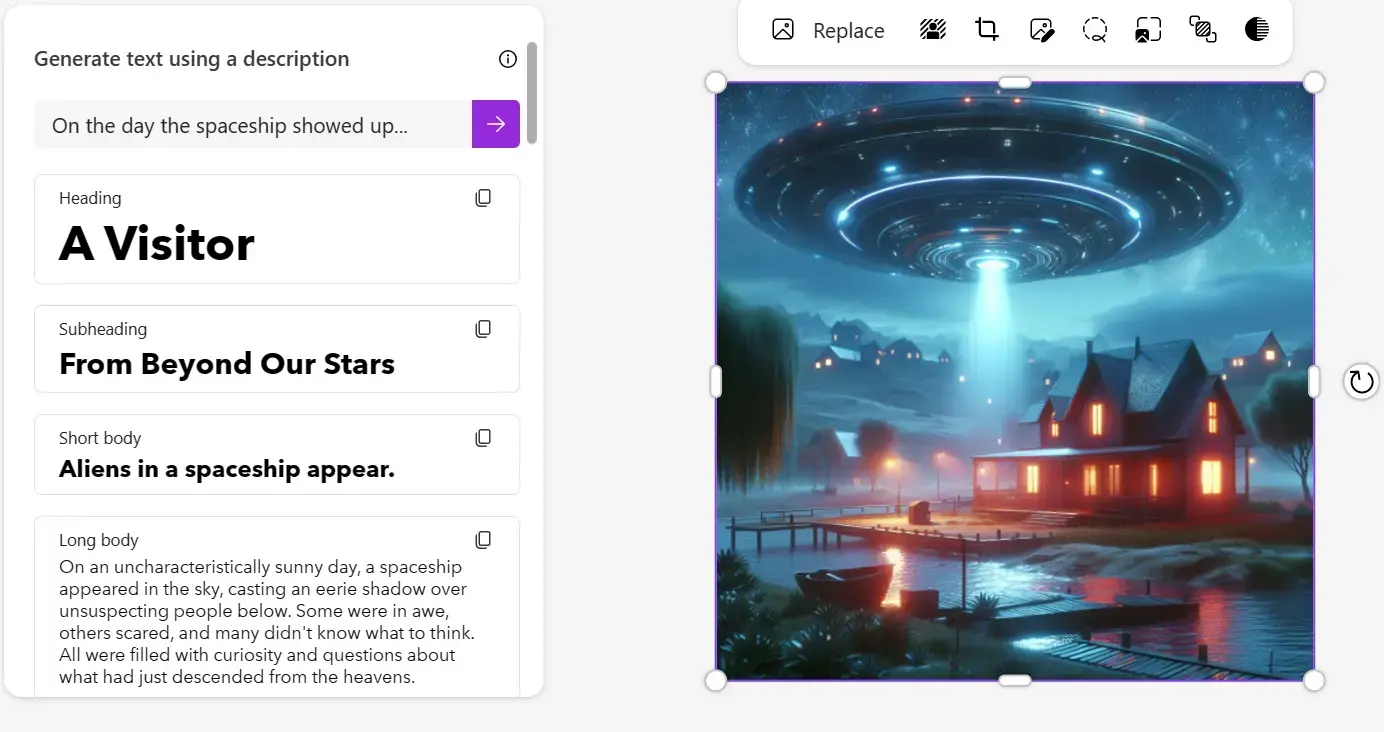
In this example, I changed the color to white and added a story starter.

Engage your students
The possibilities for using AI-generated images as writing prompts are endless! Here are a few options:
Get inspired by the artwork
The most obvious way to use these images is as direct inspiration for student writing. Generate a bold, fantastical, emotional, or silly image and have students write a story about what's happening in the image.
Try this prompt: A whimsical classroom under the sea. The teacher is a wise old octopus. The classroom is decorated with shell desks and seaweed streamers .

Bring stories to life
Another great idea is to take an excerpt from a story you're reading in class and use the AI to generate an image that matches that specific part of the story. This will spark engaging discussions among your students and bring the story to life in a whole new way.
Bring units to life
Why stop at a story? You can also generate images that fit the theme of a unit you're working on, whether you're exploring weather patterns or reliving life on the Oregon Trail.
Consider setting aside some time each day or week for students to free write or journal. Kick off the writing session with an AI-generated image, then throw on some light classical music and let them write. Mix up the kind of images you show them, from lush landscapes to abstract pop art, and see what it inspires.
Try this prompt: An abstract painting in vivid colors

You can even include animated options. After you generate your image in Microsoft Designer, select the image and Create Design . In the right-hand panel that appears, you'll see several design options. Usually, one or more of these options will be animated. Select the animated option and add it to your PowerPoint!
Accessing your AI-generated images
One of the best features of Microsoft Designer is that all the images you create using AI are saved in the My Media section. This means you'll never lose your creations and can easily access them whenever you need them.
This feature enables educators to curate a collection of visuals for various writing themes, be it aliens, dragons, or any other imaginative scenario.
Wrapping up
Microsoft Designer is a game-changer for educators looking to inspire their students' creativity. The AI-generated images, customization options, and easy access to your creations make this a powerful tool for any classroom.
Head over to designer.microsoft.com today and start creating unforgettable writing prompts!
Related topics

9 Minecraft Language Arts Activities for Kids
Do video games and language arts go together? They do when you try these Minecraft language arts activities!
Using Minecraft for Language Arts
Minecraft is a video game where players navigate a virtual world.
You can travel the world through Minecraft (it has every major biome).
You can build your own homes, cities, and landmarks.
The players can interact with one another.
You can develop your own character and make up backstories for the non-playing characters (NPCs) you meet.
Try some of these Minecraft language arts activities to get your students writing!
This article contains affiliate links to things that you might like.
9 Minecraft Language Arts Activities
Many of these Minecraft language arts activities work well as writing prompts.
Creative Writing Challenges
Prompt students to create stories inspired by in-game scenes.
Navigate the various biomes to create imaginative settings.
Build specific places within Minecraft to house the action of the story. Consider making a sunken ship, a castle, a farm, or an underground fortress.
Poetry Composition
Minecraft is an excellent prompt for stories but can also prompt poems.
Write a story poem about the action in your Minecraft world. (This can be as basic as “The Three Little Kittens” or as complicated as a scene from The Odyssey !)
You can also write a poem based on a theme within the game: survival, exploration, creativity, beauty of nature, etc.
The poems don’t have to rhyme. Here is an example:
The intrepid explorer persists
Beneath the blocks of dirt.
What treasures lie below?
Tiny rivers of copper,
Fistfulls of diamonds,
And the rarest of rare-
Glittering, green emeralds
Character Development Exercises
Create your own character. Go beyond just choosing your skin.
Think about who your character is. What is their name? Where are they from? Why are they in this place?
What do they want or need? What obstacles do they encounter? How will they overcome those obstacles?
Journaling in Minecraft Worlds
Keep a digital journal of adventures, thoughts, and reflections as you play the game.
You can use a simple word processing program to journal free-form.
Or you can respond to prompts for the day.
For example, “What are three adjectives that describe your location? Use them in a sentence.”
Here are some other ideas:
“What problem is your character experiencing?” or “What is your character doing?”
“Consider what your character might feel as they navigate this situation.”
“What might they say to other characters in the game?”
Descriptive Writing Practice
Minecraft has a variety of biomes and settings. You can find even more using Minecraft Education ( like this one set in Florence ).
Describe in-game landscapes, structures, and environments using vivid language.
Prompt students to use language that evokes the five senses.
What does the place look like? What sounds do you hear? Is it the city or the country?
What aromas do you smell?
Look around. What textures do you notice?
Narrative Building
Because your player can interact with their environment, other players, and NPCs (non-playing characters), you can construct a plot line.
Outline a sequential story from your gameplay and turn it into a story.
Dialogue Creation
Writing dialogues between characters or NPCs encountered in Minecraft.
You can write this as traditional dialogue (using quotation marks), or you can write it in play format.
You can even write a play for others to perform in Minecraft!
Letter Writing Campaigns
Practice friendly letter writing and pen letters from your player to others.
(This is not in-game messaging but actual letter writing.)
You can write to in-game characters (only those you know and trust in real life) or pen pals who also play the game.
Minecraft Storytelling Podcasts
Practice the skill of composition without writing something down!
Record audio narratives of in-game experiences to practice telling a story in sequence, using descriptive language, and crafting dialogue.
Try using the perspective of your player. For example, “I am walking through the orchard of cherry trees when I spot…”
Minecraft Language Arts Activities
Minecraft provides the necessary spark of creativity that will get your kids writing.
Use Minecraft to develop language arts skills with these nine language arts activities.
You May Also Like:
- Stormy Night Parts of Speech Virtual Escape Room
- 50+ Things You Should Do When Homeschooling
- Minecraft: Education Edition
The post 9 Minecraft Language Arts Activities for Kids appeared first on Mama Teaches .


IMAGES
VIDEO
COMMENTS
Character prompts. Give yourself the objective to write a story about: 1. A severe and stoic funeral director who is also a stand-up comedian. 2. A bodybuilder who is deeply insecure about his appearance. 3. A tough-as-nails police officer who is secretly a hopeless romantic. 4.
These creative writing prompts focus on character writing — forcing you to think closely about your character in different situations that will hopefully help you with the character development for your novel. Whether you're working on perfecting a character's voice, backstory, or personality, these prompts will swoop in to save the day.
Here's how our contest works: every Friday, we send out a newsletter containing five creative writing prompts. Each week, the story ideas center around a different theme. Authors then have one week — until the following Friday — to submit a short story based on one of our prompts. A winner is picked each week to win $250 and is highlighted ...
Feel free to let these character writing prompts inspire new prompts — in other words, you don't have to write exactly what the prompt says. One set of prompts deals with character fears and flaws. These might inspire you to write about your character's strengths and virtues. Be creative, have fun, and keep writing! Background and Family.
A loser becomes a winner. A king becomes a pauper. The skeptic becomes a believer. Often, the best arcs start with a simple question or compelling traits that become the antithesis of the conflict your character is facing. With that in mind, here are 101 character prompts that writers can test out on their characters — and their story ...
Hopefully, these creative writing prompts have helped you flesh out your characters and, in turn, your story. Choose a favorite prompt or two and use them for characters in other stories, as well! Pro Tip: If you have a great character but are struggling with story ideas, check out the story structure hub here .
101 Character Writing Prompts. Author: Natalie Harris-Spencer Updated: June 8, 2023. In order to sell a book and get it published, you need to create a product, which, for most of us here at Aspiring Author, is a novel. And in order to write the darn thing (while lamenting your career choices), you need to live and breathe your characters.
Character Writing Prompts by Role and Archetype Sometimes it helps to think about your characters in terms of their role, or archetype, as a way to narrow down your options. For example, if you need a love interest for your protagonist, you might want to consider an archetype such as the "bad boy" or the "damsel in distress."
A writing prompt is a topic or question that is used to generate ideas for writing. As a writing exercise, character prompts specifically are used to generate ideas for writing about characters, and can be used for any type of writing, including fiction, non-fiction, and even poetry.
Pick a setting in your novel. Make a list of sensory details your character might experience at that setting. Write at least two for each of the 5 senses (sight, sound, taste, touch, smell). Think about a climactic moment in your story when your hero just barely wins. Write about what would happen if they lost instead.
Join Tom Bromley for a writing master class and finish your first draft in 3 months. Browse through hundreds of creative writing prompts — and enter our free short story contest to WIN $250 and publication. Kickstart your writing now! - Page 1.
Use details and dialogue to reveal why or why not. 38. Your character's boss has offered them a significant promotion if they can get another employee to quit. Write about your character's thought process. 39. Your character has an unpleasant encounter with their rich boss, who leaves their loaded wallet behind.
Click to continue. *****. 100 Creative Writing Prompts for Writers. 1. The Variants of Vampires. Think of an alternative vampire that survives on something other than blood. Write a story or scene based on this character. 2. Spinning the Globe.
Creative writing prompts - find inspiration to: Master POV. Create compelling dialogue. Craft vivid setting descriptions. Create interesting characters. Create strong story openings. Master tense. Craft more effective sentences and phrases. Find story ideas.
Writing prompts that focus on character development can be invaluable tools for writers seeking to hone their skills and explore new creative avenues. These prompts encourage writers to delve into the psyches of their characters, unearthing their fears, desires, and secrets, and bringing them to life on the page.
100 creative writing prompts for writers Fiction writing prompts. Whether you're writing adult novels or children's books, these fiction and short story writing prompts will inspire new worlds and scenarios for your characters to play in as you write your first draft. Write a modern-day fairy tale set in a bustling metropolis. Your story ...
Key Takeaways. Writing prompts ignite imagination and help overcome writer's block. Prompts can lead to undiscovered terrains or provide a fresh perspective on familiar grounds. Using prompts helps overcome writer's block and boosts motivation. Unconventional prompts stimulate innovative thinking.
More Creative Writing Exercises Romance writing prompts. Of course, the character writing prompts and dialogue prompts can work especially well for romance stories. But I want to give a few more options for what to consider when writing a love story. And these prompts in of themselves, have been used forever.
Would you like to learn how to: Create life-like characters with purpose. Make your story come alive. Understand why characters are so important. Create characters based on their motivation and desires. Link characters to your story structure. Build your characters through a step-by-step process.
Character writing prompts to help you develop your characters. The creative writing prompts below are questions and scenarios you can present to your character. These character development exercises can significantly impact your relationship with your characters. Whether you've known a character for a while or just created a new one, using a ...
These 20 character writing prompts will help your middle school and high school students get started: Think of real people who inspire you. Base your main character on your role model. Consider writing a memoir, but make one of the main characters fictional. Use your experiences to shape the personality of the character.
Historical fiction writing prompts. 1) A librarian discovers a shocking secret about the Second World War which can change the future of the USA and Russia. 2) Write a story about a mirror that talks about an ancient era and reveals a secret about that era. 3) Craft a tale about a poet who wrote about the Red Indians.
A: While OC writing prompts are a valuable tool, they don't guarantee a successful story on their own. They are meant to inspire and enrich the creative process but how effectively they are used depends on the writer's dedication, effort, and ability to weave the character's development into a compelling narrative.
Craft the perfect creative writing prompt from Microsoft Designer's AI images . march 22, 2024. by Monica Jayasinghe. Hello, fellow educators! I recently discovered an exciting way to create engaging writing prompts for my students using AI and Microsoft Designer. The results were amazing, and I can't wait to share this fun and innovative ...
Minecraft provides the necessary spark of creativity that will get your kids writing. Use Minecraft to develop language arts skills with these nine language arts activities. Write descriptions ...
2024 April PAD Challenge: Day 1. Write a poem every day of April with the 2024 April Poem-A-Day Challenge. For today's prompt, write an optimistic poem. Robert Lee Brewer. Apr 1, 2024. ( Quick note: Just wanted to give an update that I'm still in the process of judging the 2023 November PAD Chapbook Challenge entries.